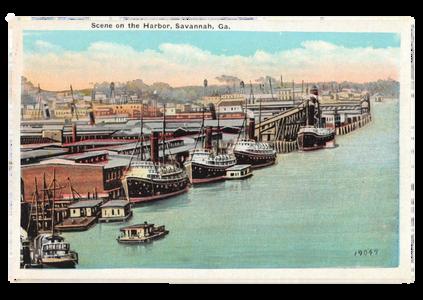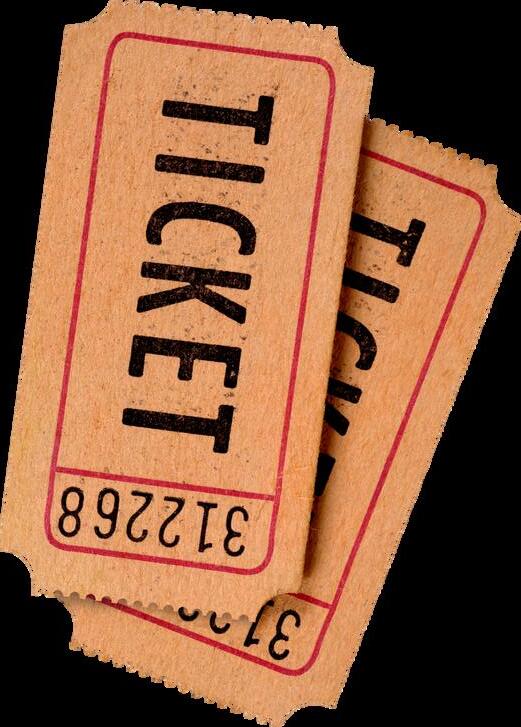







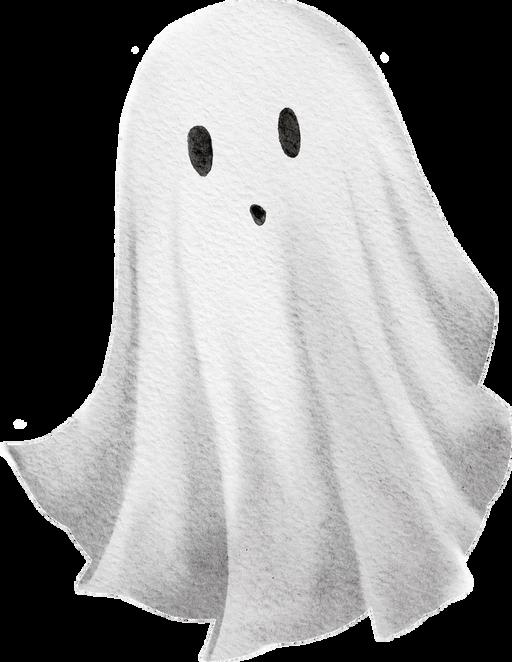

“You gotta ac-cent-tchu-ate the positive E-lim-i-nate the negative
And latch on to the affirmative
Don't mess with Mr. In-Between” -Johnny Mercer
The Literary Savannah Class of 2025 and Mrs. Floyd would also like to thank the following individuals and organizations for their endless support and guidance in our exploration of Savannah’s literary legacy:
Jacqueline Smith ~ Janie Bragg
Jessica Duthu ~ Morgan Burnette
Eleanor Cohen ~ Christine Hefner
Bonaventure Historical Society
Nell Durland ~ Bates Lovett
Michaela Shank ~ E. Shaver’s Booksellers
Clary’s Cafe ~ Mercer-Williams House Museum
Chris Soucy ~ Madison Timmons ~ JT Timmons
Keith Muller ~ LeBron James
...and all our incredible friends, family, faculty, and fellow Savannahians who are far too numerous to list here.


As we close out the second volume of Literary Savannah, I find myself reflecting with deep pride and fondness on all we’ve experienced together this year. From wandering historic cemeteries to walking the riverfront with notebooks in hand, our class adventures were more than just field trips they were invitations to see the world through the eyes of writers, artists, and dreamers who once called this city home.
This year, our class was divided into two incredible groups, each bringing its own unique energy, insight, and sense of humor (some of which will stay between us ahem, LeBron James). Despite the split, both sections shared a common thread: a growing appreciation for place-based storytelling and the powerful voices of Savannahian authors who’ve shaped the literary landscape.
We learned not just how to write, but how to observe how to turn ordinary moments into vivid scenes, and how to use language to honor both personal truth and the spirit of this city. Watching each of you grow as writers has been a true joy. To my brilliant students: thank you for your curiosity, your creativity, and your courage. I hope you carry the lessons of this course and a bit of Savannah’s magic with you into all your future endeavors.
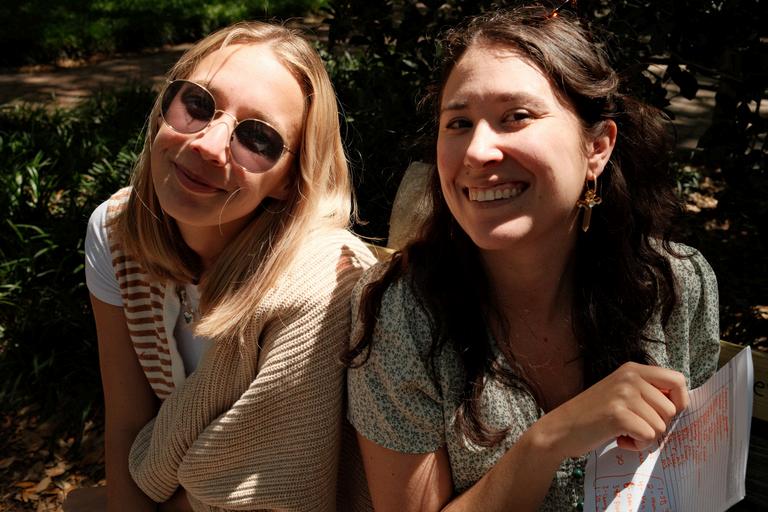








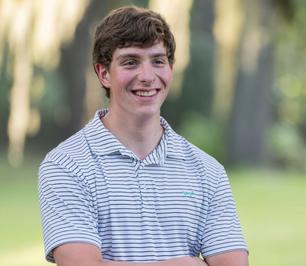
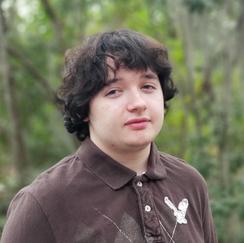






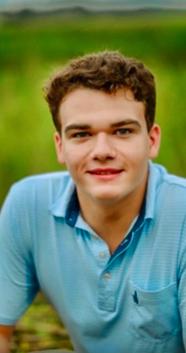





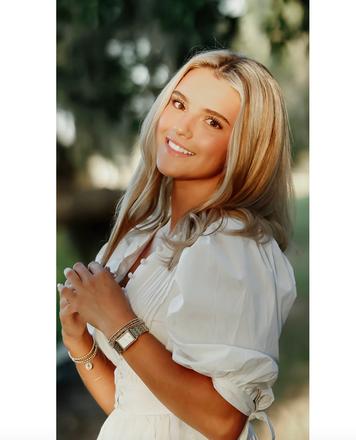



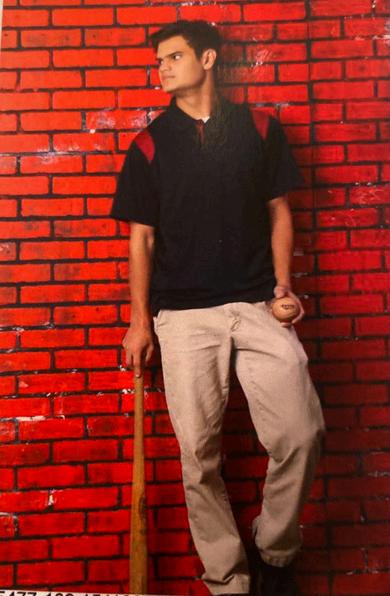
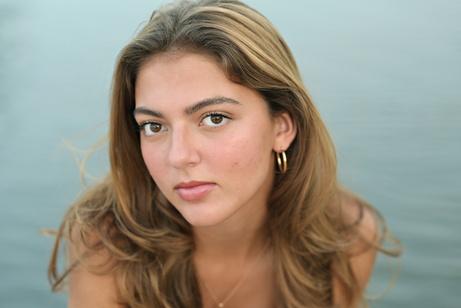


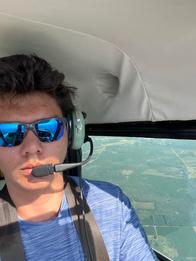



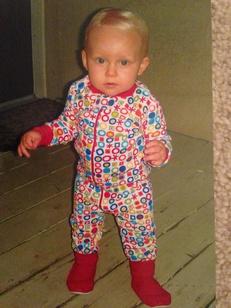
By Madison Baek
Jim Williams, sharp and poised, a gentleman, Lived in Mercer House, grand and adorned with antiques, a sight to adore.
Danny, wild tempest, an unbridled man, Whose restless soul was always his core.
The pistol’s crack brought to the strife, An end to rage, a life in vain.
The tempest stilled beneath the end of life, While shadows danced in whispered notes of pain.
Yet irony, a bitter twist of fate, Reversed the roles that many might expect.
The man of poise struck down the one of hate, And left the truth in the shadows to collect.
Amidst Forsyth’s oaks, the very truth was concealed, Savannah’s tragic bond was then revealed.
By Miles Carson
It was a dark and cloudy Halloween night at Beaulieu Plantation. The full moon illuminated patches of rice fields with beams of light that pierced through the grey clouds, drifting across the coastal night sky. News of Sherman's army had reached the camp by word of mouth. The troops were making their way through the upper end of Georgia, and it would only be a couple of months before they made it through the weakened Confederate states and to Savannah. The enslaved people were gathered in the biggest slave quarters on the plantation; it was a long, raggedy, wooden cabin built by the grandparents of the slaves who now lived there and located back in the oak trees hidden from sight of the Vernon River. It was here where they met the overseers of the plantation in private to quickly form plans for a revolt against the plantation owner, Charles Augustus Whitmore. More commonly known as C.A. Whitmore, as referred to by the other white men of the antebellum South.
Just the night before, the plantation experienced its final straw; it was time to revolt. The overseers had grown disheartened with trying to justify slavery, especially as news of Sherman's army working its way through the south in a blaze of fire had been circulating through the city of Savannah for nearly a month now. But the final blow came just the night before when, after months of attempting to force the so-called “witch slave,” Evelyn, to end her practices, led to a brutal murder. Master Whitmore had become enraged with Evelyn's defiance of his demands and ordered the overseers to torture her 8-year-old daughter in front of all the slaves to make an example of why they should do what he says.
Upon hearing the demand and the specifications of how to carry out such a crime, the overseers collectively refused, angering Master Whitmore into taking matters into his own hands.
Charles Augustus Whitmore, in a fit of rage and desire for control over all aspects of his slaves' lives, grabbed the 8year-old girl and tied up her feet. Hanging her upside down from the limb of an oak tree overlooking the marsh with her head dunked in a barrel of water, forcing her to hold her head up and to breathe. C.A. Whitmore then whipped the little girl until the color of her skin disappeared under the dark red blood running down her back. By the time he had stopped the beating, the young girl was dead, Miram, the daughter of Evelyn, forever 8 years old. She had passed out from the beating and, unable to hold her head up, drowned in the barrel of water. The slaves were enraged but were unable to do anything about the atrocity as the overseers stood aside armed to the teeth with lever actions and Springfields with bayonets. Who then escorted the slaves back to their quarters and sent them to bed.
When the plantation roosters woke them the next morning, they began the same daily routine, but the thought of Miram roamed in every person ' s mind on the plantation except for Master Whitmore and his wife’s. Throughout the day, word spread that the overseers wanted to meet in private that night, Halloween night.
Two hours after the sun finished setting, the overseers, with every weapon they could find, met the slaves in the cabin back in the oak trees, all while C.A. Whitmore sat in the living room of his house under the company of 5 house slaves and his wife, Mrs. Margaret. The overseers and slaves quickly put together a plan to surround the home from all
sides and forcibly remove C.A. Whitmore and his wife to take them down to the whipping oak and take their lives the same way Mr. Whitmore took Mirams.
The slaves, led by the overseers, surrounded the house, rising out of the rice fields with pitchforks, guns, torches, and hearts seething with the desire for vengeance. They marched through the front door led by the eldest male slave, Isaiah, protecting the house slaves as they made their way to the living room where Mr. Whitemore was having a late dinner on the comfort of his couch. Isaiah was the first to step into the living room, making eye contact with Master Whitmore as he shoved the last collard in his mouth with his gold inlaid fork. Still, before Isaiah could speak a single word, C.A. Whitmore, always armed with the revolver inherited from his father, drew his gun and, with a single shot, hit Isaiah right in the heart, spilling his “desire for vengeance” across the velvety carpet in the room. The youngest overseer, Henry Lawson, who was to the right of the deceased Isaiah, drew his six-shooter and took a shot at Mr. Whitmore from the hip, disregarding the plan to have him whipped. The bullet from Henry’s gun overshot the left shoulder of Mr. Whitmore by nearly three feet, accidentally hitting Mrs. Margret right between the eyes, sending her to the floor in a heartbeat. At the sight of his wife dying, C.A. Whitmore froze, staring at her body. While in shock, his slaves dragged him from his couch down the hall and out the back door towards the oak tree overlooking the marsh.
Henry Lawson hog-tied Mr. Whitmore's feet and hoisted him up with a rope, thrown over the same branch as Mr. Whitmore did with Miram. Lifting him only enough to where his head still dipped into the barrel of water the slaves had placed beneath the tree.
Then Isaiah's brother, Solomon, stepped forward with a whip and began striking the back of C.A. Whitmore as hard as he could. As he screamed with pain, his white shirt slowly turned into red dangling shreds as it fell apart from the whipping. Solomon whipped Mr. Whitmore until bone showed through the blood on his back, and only then did the slaves decide it was time to end C.A. Whitmore once and for all. Gripping a pitchfork with one hand, Solomon stepped closer to the dangling red mass of a human. Before he could plunge the pitchfork through the torso of Mr. Whitmore, Evelyn, who had been observing from the edge of the circle that surrounded the tree, emerged and shouted at the top of her lungs, “I damn you to roam the earth until the end of time… neither dead nor alive… but between both worlds, alone and without feelings… to serve for the crimes against your kind… humans.”
Before Mr. Whitmore could muddle a word through the blood coming from his mouth, Solomon shoved the pitchfork through his chest. Piercing his heart and draining the evil from his human form just as the moon slipped behind the clouds. A strong gust of wind blew out every torch and lantern at once, leaving everyone in silence and darkness as the thought of Mr. Whitmore's spirit traveling into the unknown lurked in their minds.
By Henry Dickerson
Brown and orange leaves crunched beneath my feet as I stepped forward, my eyes squinted as I tried to make out the path in front of me. The new moon in the night sky wasn’t bright enough to be of any use to me, only as bright as a far away star. As I continued to tread down the path, narrowly avoiding tripping over the thick roots of the trees on both of my sides. The faint sound of water flowing grew closer the farther I went down the path. I approached what I thought was a river, but there was something much more important in front of it. Its pale green eyes pierced right through me. My knees began to feel weak and I stepped backwards once to settle myself. It’s immense presence made me tremble, I felt like I was backed into a corner, unsure of what to do.
Its horns were like nothing I had ever seen. Their swordlike shapes didn’t represent the patterns of any animals I had hunted before. Being from the Low Country, I was no stranger to hunting, but in all my 17 years in Savannah, I had never seen anything like this. It had to be at least twice my height. It reminded me of a moose I had seen on a trip to Canada. Everything around us was dwarfed in comparison. It let out a loud huff and its hooves clacked on the ground with a deep crash I could feel throughout my body. I was intimidated, but I hid my fear and remained calm. Aggression emanated from it, enough to make anyone unprepared run away. I slowly reached for the rifle hanging across my back, slow enough to not make the beast suddenly flip out. The same pale green eyes followed my every move, almost as if it could tell what I was going to do.
If it knew what I was going to do, being slower with my movements would not help my situation. Before I could put my finger around the trigger, the beast leaped towards me, its right hoof slamming into my arm, sending it flying from my body. A small thud came from the ground, following the ripping feeling from my torso. As I fell backwards, my single hand was able to make the rifle fire once, the recoil twisting my body in the air as I fell. A hole replaced one of its awful eyes, and both me and the creature slammed into the ground at once...
My head shot up, sweat dripping from my hairline as I ripped the blanket off me. I reached to my left to feel my arm, and it began to burn like a bonfire. I sprinted towards the bathroom sink, rushing to get the cold water onto my arm before I even thought of looking at my reflection. Flames ran down from my shoulder to my fingertips, and as the feeling passed, a light algae colored rash followed it all the way to the edges of my fingernails. I winced in pain, but remained as calm as I could. With water dripping from my arm like a leaky faucet, I slowly made my way back to the bed, hoping to rest to get away from the pain. I couldn’t seem to make myself comfortable, because my arm was sensitive like a sunburn. After rolling over back and forth uncomfortably for most of fifteen minutes, I had to make a decision. After struggling to get dressed, I grabbed my keys as I made my way to the door. A chill sprinted down my body as I reached for the front door handle. I couldn’t shake the feeling that something was watching me. I couldn’t shake this uneasy feeling, but I had to ignore it if I wanted to do something about my predicament. Despite that, I opened the door only to be met with something that could only be described as out of this world.
I had never lived in a big house, and because of that, my yard was never very big either. It was small enough that I could ignore it more or less. Being in Coffee Bluff, an overgrown yard was nothing out of the ordinary, and didn’t make me stand out from the rest of my neighborhood. What did make me stand out however, was not only a freshly trimmed lawn, but a ritualistic symbol cut out in its’ center, resembling what only could be described as a crop circle. A familiar feeling oozed from it, and as I glanced over to my arm, the pattern formed in the rash was identical to that of the crop circle. I was usually smarter than this, but no part of this situation was remotely usual. I stepped down from the porch, taking a deep inhale as I inched closer to the anomaly. As I stared at the grass below me, the design finally became clear to me. Little Ogeechee on the bottom, Vernon on the right, and Berkshire on the left. In the middle was a mishmash of house shaped drawings, with a large forest. It took me a moment, but I realized that this could only be Coffee Bluff. One of the houses, unlike the rest, was not just a shape cut out of the grass, but a hole dug into the ground, brown dirt speckled around it.
It had to be my house, a kind of “you are here” for anyone trying to decipher this map like drawing. Instinctually, I began to look for the X, to mark the spot of whatever this map was hiding. I lowered my body to the ground and stuck my head closer to get a better look. The grass slid along my rash covered arm, I winced as the rash seemed to burn again. I fought through the pain, determined to find what I was looking for. After minutes of searching, I felt something graze my nose, a small rock hidden beneath the grass. In the dead center of the Vernonburg part of the map, its shiny exterior glistened from the sun above.
My curiosity got the better of me, and I decided to find whatever this stone marked, no matter what it took. I knew whatever it was would be able to fix this mysterious rash.
As night fell, I gathered myself and prepared for whatever may come. I had wrapped my arm in bandages, a difficult and painful process, but it was enough to keep the discomfort at bay. My boots stood tall above my ankles to deter anything unwanted I may step on, my jeans draped down over them for extra protection. My hunting jacket, lined with fur, was a bit too hot for this time of year, especially with the humidity, but I would take no chances going into the unknown. My Chevy started up without hesitation, its mud covered exterior rumbling and ready to go. It was a short drive, less than five minutes altogether, but with no sidewalks, walking wasn’t much of an option. Finding parking was no easy task either, and I wound up parking, probably illegally, in the parking lot of some nursing home. I stepped out of the car, rifle slung across my back, prepared for anything. I opened a picture of the grass map on my phone to remind myself of the location, and as I stepped into the woods, a chill ran down my spine.
Pine straw and twigs beneath my feet crackled as I stepped over them. The full moon’s light guided me through the trees, leading me to an open area with a clear view of the sky. I extended my feet carefully so as to not trip over the protruding roots of the trees. The silence was eerie, only the sounds of my own breath filling my ears. My path came to an end, behind a set of bushes in a spot between trees. Looking into the open area, something that could only be described as otherworldly lay in its center. Its gargantuan size and horselike body would normally tower over all of the bushes, yet it lay calmly on the ground, as if it was waiting for something,
or someone, to arrive. It pointed its head in the direction opposite of me, not making eye contact or showing its face. Its tall and majestic horns contrasted its deep brown fur, almost resembling the image of a yin and yang. I could tell this creature was nothing like the deer I had experience hunting, and I knew that if it saw me, it wouldn’t simply run away. I removed my rifle from across my back, laying it quietly on top of the bushes to aim clearly. My vision was clear, and I could almost picture a string connecting the tip of my gun with its forehead. My shoulders tensed as I pulled the trigger, with a bang loud enough to disturb anyone living nearby. I set my gun down on the cold ground, and reached for my pocket knife. I approached its motionless body to ensure its death. A still pool of blood formed in front of its corpse, the moonlight creating a clear reflection in it. As I peered my head down, I could see myself as if it were a mirror. My arm was as clean as a fiddle, but a set of pale green eyes stared back at me.
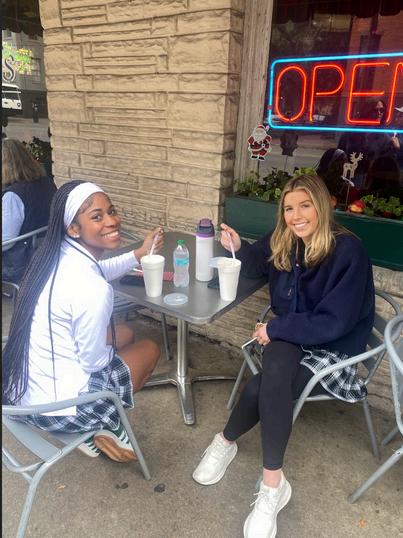

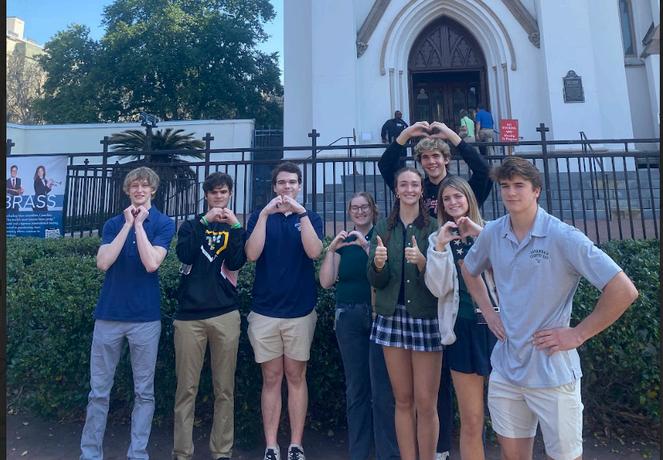
By Jackson Ezelle
In Savannah’s slick brick streets, where a secret lies
Jim Williams lives with wealth and grace
He is a man of power with believing blue eyes
Darkness hides behind his deceiving face
Jim lives in a red brick mansion filled with wealth and pride his actions follow him like a shadow, near it is a crime in silence where the truth collides his life in a knot, leaving him in fear
In court, he stands worried but with a calm-looking face
The Jury sits there like a ghost
The lawyers quarrel about this unsettled case when the truth comes out, the jury will enjoy a toast
the court came to rule for that man of mystery he could finally live free and is now a part of history
By Ian Foose
Jim Williams
Is a man surrounded by a cloud of mystery, Made by his passion for antiquities
With a taste for the finer things in life
In the house he shot his lover
Living under the shadow of conviction
Left to the jury do decide whether he was good or evil
If he only had gone to bed before midnight
All Danny had done would be forgotten, his mind full
Murdered his lover at midnight,
Saved by his good, and remembered for his evil
He died in the house he loved, the way a husband loves his wife
On the antique wooden desk in his “Blue Room”, the same place he murdered Danny Understood by no one, but loved by everyone
Satisfied with how he lived his life
Evermore buried, but buried a free man.
By Hyers Holland
Along the streets of Savannah, beneath the all-seeing spanish moss
Walks people, dancing, laughing, singing
Works of art, smiling when their paths cross
As if each carries a blissful bell, which is constantly ringing. Each person is unique you see, Living in each their own mind,
Some as magnificent as The Lady Chablis
Others like Berendt who sit and watch, the ones who the city seems to bind.
One may never understand
The extent of colors which paint the city
The people so breathtaking, edifices so grand
Old roads telling their stories, left so gritty. From all ends of the human spectrum, the people are supplied
Causing a beautiful, colorful painting, the result of the infinite worlds that collide.
By Brooks Kleinpeter
A man of New York, in a very different place
Life was much different here, a whole different pace
Everything was odd, down to the people
This place was beautiful, just like it’s Cathedral
He came to town to write a simple review
But left with more than anyone knew
Everywhere from a drag queen who could sing
To a mysterious man with many flies on a string
Savannah is like a new movie, you never know what's going to happen next
If you don't keep up, the plot will run away from you becoming vexed
John Berendt was a fly on the wall
He was a the middle man in the drama, he knew it all
With each day he stayed, the plot got stronger
His mind began to ask, should I stay longer
In the study room of the Mercer House Danny Hansford lay After this event, he had to stay
Oh, a town like no other
How could one kill their own lover
Any type of normalcy, he could not find
Savannah was truly one of a kind
By Woods Lovett
He walks down River Street smelling the salty air, a man wanting to embrace nature just to sail.
The sun shining bright off the water making a glare But the dream in his eyes draws him closer to the rail.
Looking for a way to finally leave, he sees a boat he could take. Taking a boat he is a thieve, his heart is pounding through his chest like it's fate’s at stake.
He sails down the river, waving back at the waving girl.
The blazing orange sunset makes his heart quiver. The motion of the sea makes him want to hurl, But never seeing something so beautiful, his goosebumps make him shiver.
The water talking to him telling him to stay, he wants to sail across the world but he cannot leave today.
by Cameron MacLeod
The city hums with charm, a painted grace, Old views are covered by shallow smiles, But deep beneath, an ache they can’t erase, Truth, chained deep beneath a domicile
Savannah’s racial past hangs in the air Like a ghost haunting every sunlit square. The lines are drawn, and many don't prefer To bring it up, in fear of new neckwear
And gender bends to rules of long ago, Where roles are fixed and futures tightly bound. Each voice that questions learns it must lie low, Each dream of change is lost, unheard, profound.
Savannah smiles, its charm a practiced art Voices it smothers keeps us all apart
By Allyson McCray
The Harpers were thrilled, even relieved, when they found the old, lonely, run-down shack on the lower side of downtown Savannah, Georgia. They didn’t have much money, but the house was priced well below market value, so it didn’t matter that it was a little sketchy and in need of a fresh coat of paint. But with a family of four Mom, Dad, daughter Anna, son Joseph, and their two small Frenchies, Coco and Dior they were grateful for the chance to finally have a place of their own.
The house was small but unsettling. The floorboards made a loud creak every few steps, and the old glass windows cast eerie colors of red and blue across each room. Outside, the tall, skinny oaks seemed to move and whisper when the wind blew. The first day, Coco and Dior, usually calm and friendly, were tense and jittery. In the middle of the night, they barked frantically at dark, mysterious shadows, refusing to go near certain rooms especially Joseph’s. The next morning, as they slowly woke up from a good night's sleep, Dior started barking freakishly at the empty corner of Joseph’s room, her bark filling the empty void. Coco joined in, both dogs growling and whining as if they were staring at something horrific and terrible. Joseph lay frozen in his bed, watching his dogs, their barking echoing in every room.
“Mom! Dad!” Joseph shouted. The family ran in, startled to find the dogs in a panic, pacing and barking at the creepy shadows.
“What’s gotten into them?” his dad asked, trying to calm Coco and Dior, but they wouldn’t stop. It was as if they were guarding Joseph against something only they could see.
As the sun started to slowly set down, Joseph started behaving strangely. He was unusually quiet, whispering erratically to himself, and his brown eyes now looked hollow, almost as if he were staring through his family’s soul. He spent hours alone, murmuring in a thick, deep voice they didn’t recognize. Coco and Dior would growl whenever he entered a room, their ears would raise, and they’d bark if he stood near dark corners or went toward the basement door. Anna found Joseph sitting on the porch, staring at the unkept yard with unblinking, dry eyes.
“Joseph?” she said, uneasy.
Without turning or blinking, he said, “Mr. Little doesn’t want us here. He says… we belong to him now.”
Anna backed away slowly and quietly, her heart pounding, and ran to tell their parents. They didn’t know what to do, and with no money to move or stay in a hotel, they were trapped, desperate to find a solution. They called a local historian, who explained the house’s past: Samuel Little, a famous serial killer from Savannah Ga, was rumored to have placed a curse on the property by burying his victims under the house before he killed himself, binding his spirit and his victims to it. “Those who move in here are just fuel for his spirit,” the historian warned. “Once he chooses one, he doesn’t let go.”
Seconds after their daughter rushed to them with the scary news, they quickly gathered a small amount of money they’ve been saving up and called a priest, hoping for help. With the little cash they had, they immediately made an appointment for the same night, hoping his visit would bring some peace and protection against this dark, horrific spirit that had captured their son and been hiding in their home. When the priest arrived in the middle of the night, the
Harpers gathered in the living room for a prayer circle with a lit candle in the middle, its warm light flickering against the walls, hoping it would bring some protection to Joseph. Dior and Coco circled the group, growling softly, their eyes fixed on something just beyond the light of the candle. Shadows twisted and stretched along the walls, and as they prayed, Joseph’s voice became deep and mocking, his Southern drawl deep, thick, unrecognizable and creepy.
“You can’t save him,” the voice announced fiercely, his eyes dark and terrifying. “This is MY house, and Joseph belongs to me.”
The room quickly turned cold as if they were in a morgue. Dior and Coco began barking furiously, surrounding Joseph as if to defend him. The priest, whom the family had brought in as a last hope, began ominously chanting and sprinkling holy water, his voice loud and clear.
The shadows gathered, forming the outline of a man with a crooked smile. “You have no right!” The priest yelled, his voice deep and loud, shaking the walls. But the priest’s chanting grew louder, and the figure began to flicker, fading with each word. Coco and Dior barked furiously, their eyes focused on the shadow. Out of nowhere, Joseph’s body was hurled violently to the ground, and he began to shake uncontrollably, like he had been electrocuted, something you would only see in a movie. The shadow dissipated in a burst of darkness, leaving the room heavy with silence.
They packed their few belongings and left the house that very night. They didn’t have much money, but the family knew they couldn’t stay not with Samuel Little’s evil spirit lurking there, waiting to reclaim what he thought was his. Even months later, Coco and Dior would sometimes stare into darkened rooms, barking and growling at shadows only they could see.

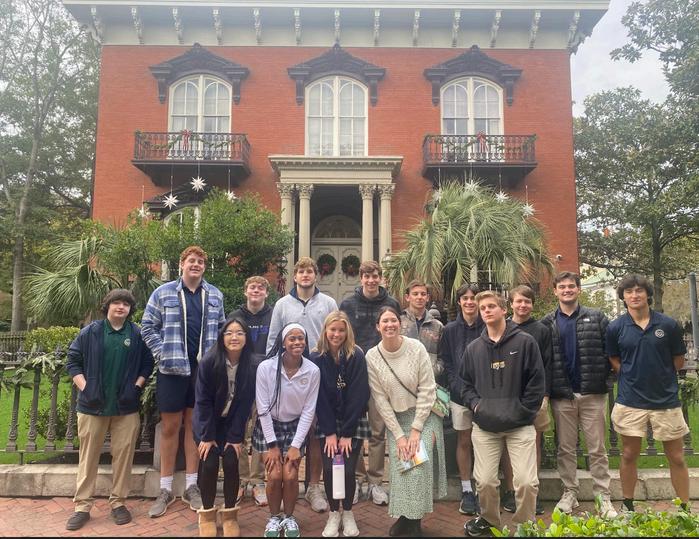
By Andrew Nicholson
Ring! Ring! Ring! The loud alarm sounded, and I frantically hurried to snooze it, trying to cease the annoying beeping in my ear. I kept tapping and tapping, half asleep, and nothing changed, the sound still reverberated through my ears. I looked up and the sound wasn't coming from my phone, it echoed throughout the entire city of Savannah. Worry stormed through my mind, what were the meanings of the alarm? Was it a tornado? Was it a misunderstanding? I tried to ignore the irritating and bothersome uproar, shooting from what seemed to be sirens.
I got out of bed and began to get dressed and brush my teeth when I heard yelling from upstairs. Yelling is common in the Nicholson household, so I didn’t think much of it. The roaring resonated as I began putting on my shoes ready to leave my house. At first, I thought it was just my sisters Abby, Audrey, Anna, and Amelia, but as I listened carefully my parents were shrill too, making it just as hard to understand what was happening, or what they were going on about. Sometimes I wake up to yelling coming from my parents or my siblings running around upstairs, but this time felt different, it felt as though rhinos were charging at one another not having a care for what was around. I knew something was off, I just didn't know what to do about it. As I walked up the stairs, the screeching became louder and louder like pans clashing against one another. Every screen in the home was taken over by a city-wide announcement telling the citizens of Savannah to evacuate to the Enmarket Arena. Without even a word coming out of my mouth, my greeting of the morning was, “run, go find anything and everything you want to keep safe.”
My mom was scrambling around the house stuffing duffle bags with clothes, jewelry, books, and photos. Panic engulfed me as my feet ran back downstairs to my room. My mind was hyper-fixated on all of the possible reasons for this distress. A Zombie apocalypse? An Earthquake? I still did not have an answer. All I knew was that I was taking my most important valuables and shoving them in a bag like I was told. Once done, I was determined to answer my questions as I was sick of all the wondering. I found my sister Amelia in the kitchen and yelled over all of the noise ‘What is going on?!” “We’re under attack.”She could barely get the words released from her lips because of the lack of breath available due to the fear that had set in. I panicked at first. I did not understand what this meant or what was going to happen next, but I knew this was not going to be easy for my family. I hurried back up the stairs to my sister’s rooms and helped carry their bag of valuables. As I began running down the stairs, the overwhelming sound of beeping made me run faster. My sisters followed behind me, and the look of desperation for tranquility in their eyes displayed the uncertainty of what was to come, the fear our entire country was feeling. I didn’t know how to fix this for my sisters, as their older brother I wanted to protect them, but I could not. For the first time, I was at a loss for how to help. My family was like dogs in a cage, scrambling to be free. Nobody knew what the future held. It had only been a few hours, but all I wanted was to wake up from this nightmare. I could not help but wonder if my life would ever return to normal. Will I ever go eat at Surcheros after practice with Barton again? Was yesterday my last time making a tackle? The yelling that once shook the house vibrantly stopped, and silence
settled in like a heavy blanket, muffling the memories of the chaos there once was.
The blaring alarms had become background noise as my family gathered in the living room ready to take the next step in our plan. I looked around waiting for some sense of leadership, but there was none, only though they were a dead man walking. A few moments passed before we started to talk about the best possible solution for us to survive.
“Should we stay in the house!?”
“Should we try and go get groceries!?” Many suggestions began to fly through the air, yet we could not agree on a solution. After debating things for what seemed like hours, we finally decided that we should try to make it to Enmarket Arena. The arena was where the U.S. army was providing resources, food, and transportation to evacuate the country. The only problem was how do we get there, and once we do, what should we expect? Is it safe to even leave our home? All we could hear were mortars and gunshots soaring through the air like an eagle trying to snatch its prey out of the dark mercury-blue waters. We piled our duffle bags into my mom ' s SUV located in the garage.
I felt like I had not been outside in ages. The gunshots became louder, it seemed as though they were getting closer the farther we were from our home. Everyone was at a loss for positive affirmations. We all knew that we needed to get to the Enmarket arena to be safe, and silence was the easiest way to execute that. Even though we were silent, the ringing of the blaring alarm remained playing in our heads. My younger sister tried to put in headphones to mask the sound, but my oldest sister and I endured the sound just in case our parents needed us.
Traffic leaving my neighborhood was treacherous. The drive to the Enmarket took around 3 hours, but it felt like days as we only moved a few feet at a time. Everyone around us was headed to the same destination, I could not help but worry about getting there too late. My mom and dad argued most of the way there about finding the quickest route, and my dad’s cautious driving caused us to panic even more. The loud alarm didn’t make the trip any easier. One thing about my father I have always admired is that even during the World War, he never expressed an ounce of stress. I tried to text my friends, yearning to know if they were safe, but the service was down all over the country. I wondered if Peter was evacuating. Maybe he already had. Thoughts like these, and my concern for others, chaotically filled my brain, just as the sky was filled with flashes from missiles and gunshots, which became beautiful in a terrifying way.
This terrific sky turned into the large building of the Enmarket Arena, and I realized that our turn had come. My mom said the evacuating aircraft would take us to England, Spain, or Brazil. My family agreed to board Plane A, with Brazil as its destination. We exited the car, surrounded by the scene of rioters all around us. I held on to my littlest sister’s hand while squeezing through the crowd of desperate people. We ran ahead and fought the crowds of other families, never looking back, of course assuming the rest of my family was behind us. By the time we reached Gate A, the plane headed to Brazil, we finally turned around and realized my parents and remaining sisters were nowhere in sight.
“Where’s mommy?” Amelia’s hand grasped mine tighter as her eyes welled up with tears.
“They’ll be here”
I didn't know where they were or if they would make it to us in time.
“Plane A now boarding,” came across the Enmarket speakers. I picked Amelia up and brought her onto the plane against her will. I turned around and immediately began to pray, hoping my family would make it onto the same plane as us. We reluctantly sat down, securing a seat before the fiveminute take-off. Frantically, I turned side to side, trying to spot any family member that I could, but the crowd seemed even bigger than before. All I could do was hope and pray.
An announcement sounded through the Enmarket, Plane A’s doors were closing in thirty seconds.
“Andrew, where is our family? Are they Gonna make it? What happens if they don’t?”
Amelia’s questions did not help. The countdown was now at 10 seconds. I began to panic, where could they be? Were they already on the plane? The plane doors shut, and silence began to erupt like morning fog on a cold winter day.
“Andrew, Andrew! Are you okay? Where are Mommy and Daddy? Answer me!!”
Tears began dripping down my face. My family meant everything to me, being with them brought me peace, gave me joy, and filled me with the comfort I needed during difficult times. A difficult time was upon us, and this was the first incident I had to conquer without their guidance. Telling Amelia what had happened was one of the hardest things I have ever had to do. The rest of my family is either on the way to England or Spain. I refuse to acknowledge the possibility that they aren’t on a plane at all, putting their lives in immediate danger. At that moment, all I knew was that we would find them.
Once we land in Brazil, England, we will begin the treasure hunt for my family. I am ready to do whatever it takes for Amelia to see my parents again and grow up surrounded by the love and comfort of her older sisters. I’m coming Mom and Dad, I promise.
“That’s a wrap, thank you for participating in our drill,” said the pilot. Amelia and I were staring at each other in shock. As we looked around the plane, everyone was beginning to get out of their seat and gather their things. I started thinking to myself, “What do I do?” At that moment, I realized that I was able to hear my own thoughts. The alarm had stopped. “Maybe this was only a drill,” I thought to myself. I picked Amelia up and walked out of the plane looking for my family. They were waiting right outside of the plane, looking just as confused as I was.
As everyone gathered in the Enmarket Arena, we heard over the loudspeaker, “We have been receiving threats from an unknown source, so we wanted to perform a countrywide drill to be prepared for any possibility.” A huge weight was lifted off of our shoulders since we knew we could go home. We are unsure of what will happen in the future, but as of right now, we are headed home and enjoying every second that we have.
By Evan Sedory
Danny Hansford
Antagonistic and short-tempered like a pitbull trained for fighting
Nobody knew the agony he was feeling.
Nobody cared about him other than Jim.
Yet one of the only people he trusted betrayed him.`
However, Danny had it coming
Aggressively threatening Jim for not supplying money.
No doubt there was something intimate between Jim and Danny
Sorrowful and relentless, he was a hurricane. Everything that was in his path was going to be destroyed.
Frustrated by Jim, Danny stormed off, whipping through the house his footsteps were like thunder,he took off in his car, backfiring with loud pops and bangs;
Ostentatious Jim had ignored his threats when John was in the room with them,
Raging with anger, he smashed a relic of Jim’s, approached Jim in his office, and said, “I may be leaving tomorrow, but you are leaving tonight!”
Dauntless until the very end
by Andrew Semmones
Jim was on Cloud 9, a local Jay Gatzby, Until he killed a Young Stoner and got Life. Back in Savannah, he was a Bubbly personality, He was With Them; his was the Hot spot in Monterrey Square.
He had to get his Gang Up. Those lawyers cost him a few Digits
Jim had to Pick Up the Phone from the lockup, And hit up Anybody that could get him outta there.
Three trials, thrice guilty; Bad Bad Bad
Sonny got a Check regardless of the verdict. They filled the halls of Mercer House, but they still had a Problem with him,
They saw Jimmy like Jeffery, he had to get out of town. Though like Jeffrey, he was freed, Things were still Super Slimey inside fabergé halls.
But you Better Believe that they lined up to be let into the Christmas party.
By Eliza Strong
She walks into any room, so sassy, Speaking whatever comes to her mind, No matter where she is, she’s always so flashy, Her shimmering clothes leave our eyes blind.
She struts through Savannah, fierce as a flame, Her laughter loud and free, The city can't help but whisper her name, As she dances with joy for all to see.
She stands so tall, proud in her space, Her spirit a force all her own, You always know where she is, by the sound of her grace, In every moment, The Lady is known.
She’s a bright shooting star, rare to find but pretty, The Lady Chablis forever alive in Savannah's city.
Feriby McCorkle
Today wasn’t my day.
My love for horror started with my moms death after fighting breast cancer for a while. That was 3 years ago. Through the years, Friday the 13th and The Shining have become my favorite horror movies. They came out the same year mom died. It’s easier to laugh at death on a screen with horrible special effects, but I’ve never seen a horror movie about a mom fighting breast cancer for two years, and losing. I lost my summer job last week. I was working at our new movie theater, so I could get discounts when new movies came out. My boss is a dick, and I apparently showed up late too many times. In my free time I’ve been watching horror movies at home alone, but my dad wants me to “invest in literature” for the sake of my brain. So that’s what I’m doing now; driving to the Live Oak Public Library to check out a book or two. I parked my car in the depressingly empty parking lot, and outside it was wet and smelt of mold, with air so thick I felt like I was walking through soup. Going inside, after feeling my perm grow in the moist air, a woman who looked to be in her late 50’s with huge hair greeted me quietly. I’m the only person here. I’m the only person with nothing better to do at 2 o’clock on a Tuesday. The librarian pointed me in the direction of the horror section, in the back of the library. There are so many books to choose from. I see a few that I’ve already seen on the big screen, so I stayed away from those. I need something new. Fresh. The aimless wandering got old, so I decided to just grab whatever book was at my eye level, right in front of me.
Ashes of the Forgotten. Seems interesting. I flipped through the book examining the length before opening the front cover to read the book description. It’s about a girl named Diana. That’s sick, “I’m the main character” I thought to myself. Ashes of the Forgotten is about a teen named Diana taking a dare to spend the night in a cemetery; but at night, while wandering around she realizes some of the graves aren’t closed or labeled because the people are unknown. These bodies, spirit, and restless deceased entities take her life and keep her there as an unknown body with them. This book didn’t seem like it was going to hold my interest for very long even though the idea of the protagonist sharing my name is pretty cool. I put it back, grabbing the book to its immediate right, Echoes from the Locked Room. This story is about a girl “gone crazy” who is taken to an asylum and tortured to the point of death. A girl named Diana. Two times is crazy. I guess my name is more basic than I thought.
Curious, I flipped to the first chapter, a chapter that normally contains character descriptions. She had chestnut brown hair, she was 19, my same height, living at home only with a father. I would just call my hair brown but, this Diana is my same age and height. I grabbed Ashes of the Forgotten and looked for Diana’s description. She has a perm, no mother, recently lost her job, and the same car as me. I thought these books could be in a series, written by the same author sharing a protagonist. I made sure to check, but the booms were released in the same year and written by two different authors. This is a funny coincidence I would make sure to tell my dad about later. I went to a different shelf to escape the Diana books and picked up A Feast of Quiet Screams. I open the cover and Diana is the first word I see.
It’s larger than all of the other words. It’s me again.
They’re all me. In this book I am stalked to the point of insanity then I take my own life. I’m over this now. I grab a book with roses on it titled, The Greatest Love. It looks like it’s been placed in the wrong section, but any book not regarding my death is fine with me. I skip the book description and open the book right in the middle. The first sentence on the page states, “As the knife sat in Diana’s chest, the pain of being betrayed by her lover was greater than the blade squelched in between her ribs.” I’m starting to feel hot. So hot I need to rip all of my clothes off. My upper lip is sweating. I run at the librarian with all four books in hand yelling,
“WHAT IS THIS?! HOW DID YOU DO IT?!”
“Dear?” she chirps with concern in her eyes, “What’s wrong?”
I slam the books on the table. Opening the pages for proof.
“Every single one is written about me”
She looks shaking her head in denial and disbelief. “Honey these books are fiction, none of them are written about you.”
“But I’m the character in every book.”
“Amy, Sara, Penelope… these are all different names.” She’s confused.
All I see is Diana. My name. My doom. I ran back to the shelves with a sense of hurry and panic. Ripping books off of the shelves, every single one containing my name. The pile of novels on the floor begins to grow. I rummage through my purse looking for my little purple lighter. The power over the books now rests in my fingers. The different variations of my death swirl in my head.
Stabbed in the heart, tortured, suicide, and paranormal activity.
How dare that lady think I’m crazy? I don’t deserve this. I pick up the last book on the shelf. I flip through it, but all of the pages are blank. I exalt a sigh of relief before finding the only page with text.
One obscure sentence reads. “It’s inescapable Diana, accept it.”
I add it to the pile, spark the lighter, and start burning the books. The flames grow without hesitation, eating away at every page. The smoke fills the library, invading my lungs. The librarian screams and runs for the fire extinguisher, but I beat her to it. I take the metal container and swing it at her head, bashing it in. You thought I was crazy. Her blood splatters on the carpet. Now it is just me and the books. The flame has spread, quickly eating away at all of the books and soon the building itself. I wipe the fire extinguisher off on my jeans, and drop it on the floor. I grab my keys and walk to the car. Driving away, all I see in my rearview mirror is the library in flames. I wipe the sweat from my lip and forehead.
Today wasn’t my day.

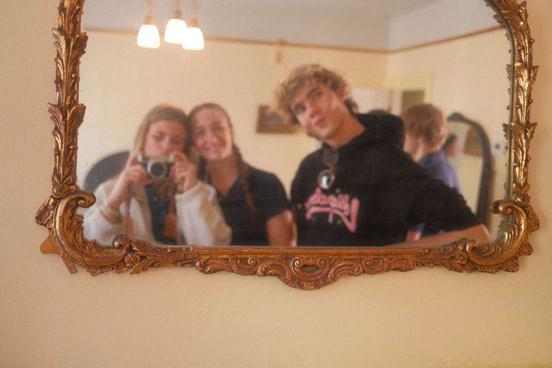
Born Jan. 2004, Died May 2025
He has Carried many miles Ran many cycles
Three hundred thousand coming up You’ve been a good truck
From taking me home from the hospital
To me taking you to the junkyard
You’ll always be my favorite car
When I wander the Mercer House under the chandeliers, the portraits watch with their silent eyes their secrets drift, soft and low.
“Tick tock,” says the clock.
Every shadow creaks across the floor, like Danny’s hand, still clenched in rage, forever reaching for my chamber door.
“I acted fast,” I told the stained glass,
“In fear, in wrath no less, no more.”
The midnight silence breathed out, “Are you sure?”
The storm had paused; the court adjourned.
I looked alone where Spanish moss swayed in the street each vine a noose, each leaf a name, watching the hanging trees. For each gust, it whispers from its knees:
“I didn't plan it,” I mouthed once more.
“It wasn’t murder just the war.”
Yet I felt the trees fluster, “Are you sure?” His boots remained. His cologne. His laughter echoed down the stair, and every golden frame grew dim, as if he were still lurking there.
The pistol cleaned and locked away burns bright each and every midnight.
His blood has dried, but not my thought: was justice served, or only in the ‘Ol There Before’?
“They freed me,” I told the mirror. “The jury told the truth and nothing more.”
Yet the mirror whispers, “Are you sure?”
At times I dreamt of Danny’s voice a slur, a laugh, a continually rising yell.
But now I hear it with restraint from my tiny cell. “Was I too much?” his echo asked. “Did I deserve the bullet’s chore?” I drank and shocked the air. “You know what happened, you swore.” Yet in the hush, the room replied, “It happens once. It happens forevermore.”
So I sit, cuffed in front of my chamber door a verdict stored in my heart, yearning for a man in the ‘Ol There Before.’
For neither court nor the years gone by can hush the truth that roams these halls.
Should you knock on Mercer’s chamber door, you’ll hear me pacing, evermore, repeating softly, “Nevermore.”
By Daniel Bosch
The 1790 Inn stood at the corner of a narrow, cobbled street, its lanterns flickering weakly against the coming dusk. Nathaniel Hargrove’s boots sunk into the damp as he approached the door. He had heard the stories, of course. He checked in without any issues, exchanging a few words with the innkeeper, a tired woman with big eyes. Room 204. The room was modest: a heavy wooden twin in the corner, a writing desk, a single tall mirror. A candle sat half-melted in a stone holder. It was colder inside than in the hall.
Nathaniel set his travel bag on the chair, rubbing at the stiffness in his fingers.
The first night passed uneventfully, though he dreamed strangely. A woman’s voice, distant and illegable, like it was carried through water. Laughter behind a locked door. He woke, drenched with sweat, though the sheets were cool beneath his hands. The mirror had fogged over, the air was dry.
He dressed and descended the narrow stairs to the tavern, where smoke from the furnace and the patron’s pipes hung on the air. Some muttered over their drinks. Nathaniel found a seat near the window, where the morning light slanted through the glass.
"Ghost hunter?" the innkeeper asked when she placed his coffee down.
"Writer," he corrected. "Researching local stories."
"You’re in the right place, then."
He met with an elderly man in the afternoon, a historian who had lived in Savannah his whole life. Over whiskey, the man told him about the Lady in Red a woman seen in passing glances, never quite in full light. Some said she had been a mistress, abandoned by her lover, and had thrown herself from the balcony. Others claimed she was a demon. One thing remained: those who saw her never left the inn unchanged.Nathaniel walked back to the inn at dusk, his boots loud against the wet cobblestone. The thought unsettled him, but he reminded himself that these stories were only that. He had stayed in so-called haunted rooms before. Ghosts did not frighten him.
That night, he left his journal open on the desk, scrawled notes smothered the page. He drifted into sleep easily but woke without knowing why. The room was dark, except for the faint glow of embers in the fireplace. Something felt off, though he could not place it at first.
And then he saw it.
The mirror.
The tall glass stood across from the bed, and though the room was still, the reflection was not.
A woman sat in the chair by the writing desk. Her hands rested lightly in her lap, her posture elegant, expectant.
Nathaniel did not move. He watched the reflection, heart hammering in his chest. The chair was empty.
The woman did not blink. Her gaze was dark, unreadable, fixed on him. The dress she wore was not red, as the stories had said, but black. Mourning black.
The wind wined against the window. The reflection did not flicker.
Nathaniel’s eyes were wide open. Slowly, carefully, he reached for the candle on the bedside table, lighting it with a match. The warm glow filled the room
The mirror was empty.
The next morning, Nathaniel rose early. He left the inn for the better part of the day, walking the city, speaking to locals, never mentioning what he had seen.
When he returned at dusk, the innkeeper was waiting for him.
"You should leave," she said plainly.
Nathaniel paused. "Why?"
She wiped her hands on her apron and met his eyes like ice. A chill traced his spine. He managed a weak smirk. "Maybe that's why I came. "
The innkeeper only sighed. "She knows."
That night, he did not sleep. He sat at the writing desk, quill idle in his hand. He had planned to leave the next morning, to abandon his research and walk away from whatever lived in this place. But something kept him rooted to the chair.
A sound. Soft, distant. The rustle of skirts.
The candle flickered. The mirror fogged.
Nathaniel turned slowly.
The chair was no longer empty. She was there.
Closer than before.
This time, she smiled.
The candle sputtered out. The room fell into darkness. And Nathaniel Hargrove was never seen again.
By Thomas Wynn
In Savannah, where the air is thick with secrets, And time leans lazily against the wrought iron gates, A ghost plays jazz beneath a moon-stained oak, While shadows sip bourbon behind lace curtains
Here, the garden blooms at midnight
A place where good and evil lean in close like gossip from a swing.
Walking slowly through Chippewa Square
A figure not born of moss or magnolia, But of courts and courtside dreams
Lebron, the king adrift in Spanish moss
His sneakers whisper against cobblestone
Like the promises that are never kept quite
He dribbles the past like it's a phantom
Each bounce echoes Savannah's pulse.
A talisman in his hand, not a ball, but a skull
Painted gold with stories of glory and grief.
Like Jim’s grin beneath candelight
Lebron’s myth floats
Part truth, part tail
Taller than oak and more haunting than jazz
The presence, both holy and hoodoo
The garden watches
As patient as the dead
Even kings bow to the weight of the moss.
By Henley Schivera
The humid air clung to Clara’s skin as she walked along the cobblestones of River Street. The sun was setting, casting long shadows over the historic buildings. The air buzzed with the sound of clinking glasses, the chatter of tourists and locals, and the occasional creak of a boat drifting down the Savannah River. It was a beautiful scene, yet there was an undeniable weight in the air, as if the past lingered just beyond her grasp.
Clara had just arrived in Savannah a few days ago, seeking a brief escape from her hectic life in Atlanta. She wasn’t sure why, but the city had drawn her in. Perhaps it was the history, the old buildings covered in ivy, or the Spanish moss that hung from the trees like a curtain hiding forgotten secrets. Whatever it was, she felt like she was searching for something even though she didn’t know what.
As she walked along the waterfront, she took in the sight of the tall ships docked nearby, their flags waving gently in the breeze. She had heard that River Street was especially beautiful at night, with street lights illuminating the cobblestones in a warm, golden light.
That was when she noticed the woman.
She stood on the corner, perfectly still, her long gray dress swaying slightly in the wind. Her silver hair was neatly pinned back, and even though she was not looking at Clara, there was something about her that made Clara’s skin crawl. It felt as if the woman was listening to something beyond what anyone else could hear.
Clara hesitated for a moment, but her curiosity pushed her to step closer, overriding her initial unease. The woman seemed oddly out of place, as if she was a part of a different era entirely.
Slowly, the woman turned toward her.
“Good evening, miss,” she said, her voice gentle and soothing, but there was something in it that made Clara feel uneasy, as if the words held a deeper significance.
Clara’s heart raced. It was not just the woman’s voice; it was her eyes. They were a stormy gray, watching her closely, as if she already knew her. Clara forced a polite smile. “Good evening,” she said, though her voice felt too loud in the quiet night. The woman maintained her gaze. It felt as if she was analyzing Clara, weighing some unspoaken decision.
“You must be new to Savannah,” the woman finally said, a knowing look in her eyes. She tilted her head slightly, “Newcomers carry the weight of this place, even if they are not aware of it yet.”
A shiver ran down Clara’s spine, despite the warm night air. “I’m just visiting,” she said, trying to sound casual, “I’ve never been here before.”
The woman smiled softly. “Savannah is full of stories,” she said. “Some are meant to be forgotten. But others never truly leave.” She pointed toward the street, the river, and the towering oak trees.
Clara swallowed hard, “What do you mean?”
The woman turned to the river, her expression unreadable. “This city has its secrets,” she said, “And some of them whisper in the wind, especially on nights like this.”
In the distance, a bell rang, marking the hour. Clara blinked, suddenly realizing how much time had passed. The street was quieter now, the final rays of sunlight disappearing as the street lamps began to glow.
The woman’s voice dropped to a whisper, “Don’t go looking for things you aren’t ready to find.”
Clara wasn’t sure how to respond. Just as she was about to step back, the woman reached out and lightly touched her arm. Her fingers were far too icy for the warm summer evening.
“Savannah remembers,” the woman murmured, “It always remembers.”
Then, just like that, she turned and walked away, disappearing into the darkness of an alley.
Clara stood there for a long moment, her heart pounding. Did that really happen? Or was it all in her head?
The air around her felt heavier now, as if an invisible weight was bearing down on her. She took a deep breath and kept walking, attempting to free the encounter from her mind. Yet, the woman’s words lingered, trailing behind her like a shadow.
As she turned onto a quieter street, she heard something. Music.
Soft and slow, drifting through the air like a fading memory. It was a sad tune, like an old hymn played on a distant piano. But, there were no pianos nearby.
Her feet moved before she could think, drawn toward the sound. The melody led her down a narrow alley, where the scent of damp earth and aged brick filled the air. At the end of the alley, she found a small courtyard enclosed by iron gates with ivy windng over the metal.
In the center, beneath the twisted branches of an ancient oak, sat a man playing a violin. He wore a dark suit, neatly pressed, but there was something about it that felt dated, as if it had once belonged to someone else. His bow danced across the strings, the notes filling the night with a haunting beauty. It was more than just music, it was a story, full of longing and sorrow.
Clara hesitated, her pulse quickening once again.
The man’s eyes snapped open, meeting hers with the same knowing look the woman had given her earlier. “You heard it,” he said softly, “Most don’t.”
Clara’s throat went dry, “Who are you?”
He smiled faintly, lowering his violin, “Someone who remembers.”
Her stomach twisted, “Remembers what?”
The man nodded toward the oak tree beside him. “This city has a way of keeping its history alive,” he said, “Some of us become part of it.”
Clara followed his gaze and noticed a small plaque at the tree’s base, partially hidden by fallen leaves. As her heart raced, she brushed them away, revealing the words beneath: In Memory of Evelyn Mercer, 1884-1913. Gone, but not forgotten.
Clara’s breath hitched. Mercer. The name felt familiar, but she could not place it. She turned back to the man but he was gone.
The violin, the music, and the presence gone as if they had never existed. All that remained was the wind, rustling through the branches. A chill ran down Clara’s spine. The woman’s voice echoed in her mind. Savannah remembers. And Clara felt a terrible feeling that before she left, she would remember too.
By Mathias Weiland
The early morning sun slanted across the tarmac of Hunter Army Airfield, casting long shadows that stretched like fingers from the planes lined up along the tarmac. The air was thick with the hum of activity mechanics adjusting engines, officers barking orders, and the occasional laughter from a group of soldiers taking a brief recess. But amidst the flurry of war preparations, a sense of isolation clung to a pilot as he approached the massive silhouette of the B-36 Peacemaker, standing as a monolith on the field.
Major Samuel "Sam" Caldwell had spent more time in the cockpit of the B-36 than anyone at the base. He had flown it more times than any of his comrades, each test flight pushing the boundaries of what the aircraft was capable of and each one dragging him a little further from what he had joined the Army to do. Sure, he was a test pilot, but he was also a man with a conscience.
But war had a way of stripping the glamour from heroics. The constant barrage of missions, the lives lost, and the faces of fallen friends burned into Sam's memory. He had come to hate the war, even as he fought to win it.
Months later, the war came to a decisive, terrifying end. The B-29 Superfortress had done what no aircraft in history had done before dropped a weapon powerful enough to erase entire cities. Hiroshima, then Nagasaki. In the aftermath, the world shifted, as did the nature of warfare. No more islandhopping campaigns, no more desperate dogfights over the Pacific. The war was over, but the skies had changed forever.
He returned to the mainland to be a test pilot. His combat experience made him an invaluable asset, and soon, he found himself assigned to the B-36 project. The Peacemaker was the pinnacle of aviation technology massive, with six engines and a range that could take it halfway around the world. It was everything Sam had fought for and yet, somehow, everything he had come to dread. No longer was he engaging in the visceral combat of a dogfight; now, he was testing an aircraft that, if successful, could potentially change the very nature of warfare.
The aircraft loomed before him, a giant of steel and ambition, its six engines silent for now, still radiating the heat of their last run. Standing beneath its massive wings, Sam was small an ant staring up at a storm. The sheer size of the Peacemaker was enough to awe, the kind that made his breath hitch just slightly. It was unlike anything he had previously ever flown, a machine built to go farther, fly higher, and deliver more destruction than any bomber before.
He glanced at the engineers making final adjustments, their hands moving with careful robotic precision, their gazes lingering on the aircraft as if admiring a masterpiece. One traced a hand along the mid-part of the fuselage, feeling the smooth metal as if reassuring himself of its strength. Another tapped the cowling of an engine, his lips moving slightly maybe running through a checklist, or maybe whispering some quiet hope that everything would work as intended. They saw promise in the Peacemaker, a future in rivets and bolts.
Sam exhaled slowly, eyes drifting to the towering wings, the gleaming propellers, the labyrinth of wires and hydraulics that still carried more questions than answers. Would it ever be ready in time? Would it ever even be needed? The war in Europe and the Pacific was over, and the Communists were still technologically behind. The B-36 was meant to change warfare, but how many wars were left to change?
As he climbed into the cockpit, he ran his fingers over the control yoke, the metal cool against his palm. Every flight tested more than just the aircraft it tested the very reason for its existence.
On his right, Captain Mack Holden his copilot settled into his seat, adjusting his headset with the ease of a man who had done this a hundred times before. Behind them, the flight engineers, Chief Warrant Officer Alan Briggs and Sergeant Tom O’Reilly, worked through their checklists, flipping switches and murmuring numbers as they monitored the aircraft’s systems.
The low hum of the B-36’s waking engines vibrated through the fuselage. Sam’s gaze drifted across the massive console, filled with instruments that read like a foreign language. Mack shot him a quick nod a silent confirmation that they were both ready for another long flight.
“Power readings look good,” Briggs called from behind. “Fuel pressure’s steady.”
O’Reilly, younger but sharp, tapped one of the many gauges and muttered, “For now.”
Sam’s breath steadied as he ran through the pre-flight checks, his mind already turning over what was to come. The takeoff would be smooth, as it always was, but the long flight ahead flying over the vast expanse of Georgia’s coastline and Savannah would test the limits of the aircraft once again. More problems would emerge. They always did.
Is this it? Is this what I was put here on Earth to do? Test these planes that could cause more deaths in a single afternoon than in many years!? His mind spun, and his vision stirred.
“Ready, Major?” a voice crackled over the radio, bringing Sam back to focus. His superior officer, Colonel Harrington, always checked in before each flight.
“Ready as I’ll ever be, sir,” Sam exhaled sharply, tightening his grip on the controls.
The massive B-36 ascended, and Sam Caldwell carefully eased the controls, feeling the aircraft’s weight lift into the sky. Below, the city of Savannah unfurled like a patchwork quilt cobblestone streets winding through a landscape of moss-draped oaks and little antebellum homes and shops. The gentle curves of the Savannah River gleamed like silver in the sunlight, cutting through the city and stretching out to the horizon. From this height, the world seemed peaceful and serene, a sharp contrast to the confusion he carried in his chest.
Sam allowed the aircraft to gently bank left, following the river paths as it meandered through marshes and quiet estuaries. Tybee’s coastline stretched out, framed by golden sands, gentle dunes, and the untouched wilds of swamplands. It was a beauty he hadn’t fully appreciated in years, too consumed by the noise of war and the cold precision of his test flights. But today, the view felt different. The peaceful landscape below almost mocked the conflict within him as if the earth were untouched by the chaos that raged above it.
His thoughts drifted back to the B-36, the great machine that seemed more like a beast than an aircraft. He knew it had potential he had flown it enough times to see its strengths. But with each test flight, when he had pushed its design limits, a gnawing unease festered within him. Was he part of something meant to protect, or merely enabling a machine built to destroy? The thought must have slipped out, barely more than a murmur.
"Feels like we’re testing something we’ll regret."
"What was that?" Holden inquired as he looked over from his seat.
Sam exhaled through his nose, shaking his head. "Nothing," he said, eyes fixed on the horizon. But the words lingered, heavier than he wanted to admit. With its old-world charm, Savannah felt like a stark contrast to the high-tech, cold reality of the B-36. Sam had always been drawn to the stately homes of the Historic District, the towering oaks draped in Spanish moss, and the quiet weight of history that clung to the city’s streets.
He had walked past the Flannery O’Connor Childhood Home, its pale brick facade blending into the row of historic houses, and watched the slow churn of ships along River Street, their hulls heavy with cargo bound for distant shores.
But even this place, with its cobblestone streets and iron gates with stone pineapples, was not untouched by the war. Soldiers passed through the Marshall House’s grand lobby, their uniforms crisp but their eyes weary, lingering beneath the electric chandeliers before moving on to their next destination. Families gathered on the platform of the Central Georgia Railway, their goodbyes swallowed by the hiss of steam and the low hum of departing trains. War wasn’t fought here, but its presence was everywhere.
Sam had seen it, too, in the eyes of the engineers and officers who worked with him each caught up in a mission that seemed beyond their control. His grip tightened on the controls as the plane banked again, a sharp turn taking him over the coastal marshlands. The winding rivers unfurled below, their lazy currents mimicking the passage of time, each bend deepening the burden in his soul. He had seen men die in battle and become a cog in the war machine he once fought against. He couldn’t shake the feeling that his role in the war this test of the world’s might was becoming less about defense and destruction. It was a shift that tugged at his conscience, and no matter how high he flew, the question remained.
Sam’s eyes traced the horizon as he pulled the plane back into level flight. The sky, so expansive and full of possibility, seemed both an escape and a cage. Below, Savannah was the same, a city full of quiet moments and lives untouched by the planes above them. How long would it remain so, he wondered. How long before the very beauty of this place its untold histories and peaceful shores was consumed by the weight of the machines that now ruled the skies?
Sam eased the yoke forward, aligning the aircraft with the river below. The Savannah River cut through the city like a dark ribbon, winding past the docks and the red-bricked buildings of River Street. Even from this altitude, he could make out the familiar landmarks the old cotton warehouses, the clustered shops, the rows of iron balconies overlooking the water.
In the nose of the aircraft, First Lieutenant David "Davy" Pierce, the bombardier, peered through the bomb sight with the focused intensity of someone who had trained to turn a calm street into a target in an instant. Davy was an eager sort, his brown hair always a little too messy, his face perpetually caught between concentration and the unease of knowing what he could do to a city with a single command. He had been in a B-29 in the Pacific, but Savannah felt like a different kind of challenge, one where nothing had yet been shattered.
“Lining up,” Davy muttered, his fingers moving over the controls, his right eye peering through the bombsight. His breath fogged up the glass as he adjusted the sight, his mind working through the steps for a mission that wasn’t supposed to happen today.
For now, Savannah remained untouched. But for how long?
Sam eased the B-36 down toward Hunter Army Airfield, the massive aircraft humming in a way that now felt like a reminder of the weight on his shoulders. The flight, which had begun with a sense of purpose, had dwindled into something more like a march each test, each turn, each moment a silent confirmation that something was wrong. He had never felt more out of place than in the cockpit of this beast. The sight tests, the precision flying it was all growing more difficult to justify. Savannah, with its quiet streets and old buildings, seemed so far removed from the cold, metallic reality of the Peacemaker. Later, as he stepped out of the cockpit and onto the side of the plane, Sam hopped down, and his boots hit the ground with a heavy thud. The roar of the engines faded behind him, but the hum of doubt continued in his mind. Stepping toward the hangar seemed slower, like the distance between him and his decision grew wider with every passing moment.
In the hangar, Sam didn’t even pause before heading straight for the office. The door to Colonel Harrington’s office creaked open, revealing a frozen space. The walls were lined with faded maps of flight routes and strategic positions, yellowed with age but still full of the weight of past decisions. The air smelled faintly of stale coffee and old leather, with chairs worn from years of use but still solid. A large desk sat in the center, cluttered with paperwork, aviation blueprints, and a few personal items a framed photograph of the colonel’s family, a small, polished brass model of a P-80 Shooting Star, and a half-empty glass of water, untouched for who knew how long.
The overhead light casts a dull glow over everything, making the room smaller and more confined. Harrington sat at his desk, his posture casual, but his eyes darted to Sam, as though he had been waiting for this moment.
“Sam,” Harrington greeted, his voice steady but laced with a hint of concern. “You look like you’ve had enough.”
“I want out,” Sam stated strongly, his eyes solemn as he stared into Harrington.
Harrington studied him carefully, his expression unreadable. “Out?”
“I don’t want to fly these planes anymore, Colonel,” Sam said, his voice breaking with frustration. “I don’t want to be part of the future they’re trying to build… It feels wrong. I’ve seen too much. I don’t know how to keep doing this…”
The silence between them grew thick. Colonel Harrington crossed his arms, leaned back in his chair, and regarded Sam for a long moment.
“You’re not the first,” he said softly. “But I understand.” He leaned in, his voice lowering. “Sam, you’re more than a soldier. You’ve got experience and insight. Maybe it's time to put that to use somewhere else.” He paused. “I can offer you something in the commercial aviation sector. There’s a growing need for experienced pilots who can help guide new technologies in civilian aircraft development airlines, cargo companies, and even aviation consultancy. You’d be putting your experience to good use, and be away from military projects.”
Sam looked up, still unsure. “You think I can make that kind of jump?”
“Why not?” Harrington said. “You’ve seen how things work from the inside out. You understand aircraft, systems, and operations. It’s a natural transition.” He paused again. “I can connect you with people in that world. They’ll value your expertise, especially as the industry sprouts after the war.”
“I’ll think about it.” Sam softly said, his words trailing behind his voice like contrails on a supersonic aircraft.
“Take your time,” Harrington said. “You don’t have to make a decision now. But don’t sell yourself short. There’s a future for you, just not in the cockpit of these warplanes.”
As Sam turned to leave, the colonel’s voice stopped him. “Oh, and Sam,” Harrington added. “The B-36 is probably going to be shelved soon anyway. The costs are too much to keep it in production, and with jet bombers arriving off the assembly line, the need for a plane like this is fading fast.”
Sam nodded, a small flicker of understanding flashing across his mind. The war had already changed, and the machines that had defined it would soon be left behind.
By Thomas Federowicz
In Bonaventure, the air hardly moves just enough to stir the moss, like someone breathing secrets into the trees.
The graves don’t sleep, not really.
Stone angels lean in, as if they’re listening. Midnight isn't just a time here it’s a feeling, the hush right before something breaks, or someone confesses.
Jim’s house gleams, but not all that glitters is clean. Behind polished doors, the air is thick with charm and consequence. Savannah smiles like she knows something you don’t.
And if you’re not careful, she’ll tell you softly, while pulling you under.
By Campbell Highsmith
The heat sticks thick as Spanish moss, drizzling with secrets the old bricks keep. A screen door bangs somewhere on Jones StreetAnother widow slept through the night.
The Lady's heels click down the stairs, her perfume cutting the fog. She winks at ghosts in the mirrored bar, orders bourbon in a backstreet room.
The water crawls slowly by the river, carrying scandal from the cotton rows. A judge's gavel still echoes somewhere But the truth was lost in the courtroom air.
Oh, Savannah, with your sweet-tea smile, You hide your knives in civilized style. Your garden's full of nice weedsWe all pretend we don't see the seeds.

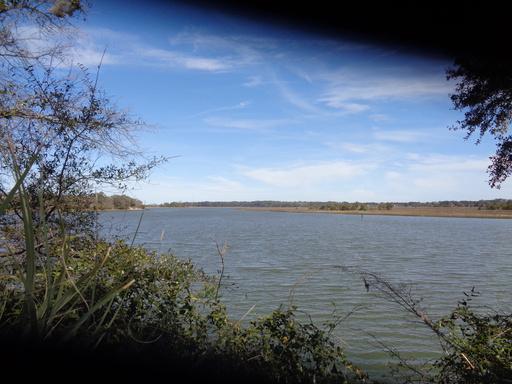

by Nell Strength
It was the hottest she’d ever been. Stella’s skin felt crisp under the hot summer sun as she walked to the beach from her parents’ rental. Her feet slapped the burning asphalt as she passed six colorful houses to get to the boardwalk. Her rental was teal, the next was yellow, then pink, dark blue, purple, green, and white. The houses were adorned with colorful buoys and nets like the owners were trying to bring the oceans to their homes. Or maybe they were trying to fit the “beachy vibe” to get more people to stay in their Airbnb. It sure worked on her parents.
The wooden boardwalk felt dangerous like every step would give her a splinter. She thought the sand would be a relief, but it felt like fire. As her feet imprinted on the scalding sand, she searched for a place to settle down. The beach was surprisingly empty, only occupied by a handful of fishermen and people tanning. The dry sand next to the foreshore was the best spot she could find.
Her towel flapped in the wind as she tried to get it on the ground. She dropped her water bottle on it to keep it from flying away, sat down, and picked up “Beach Read” by Emily Henry. She laid against the towel and held the book to block the sun.
Someone must have been playing music on their speaker. Stella thought it was a little pretentious for the beach: it sounded like opera or something. She couldn’t get the high soprano out of her head as she tried to focus on the book. Usually, she could fall into a good story like Alice in Wonderland, but she felt like the voice was pulling her out of fantasy land and into the real world. If she couldn’t fight reality, she might as well join it.
Sitting up, she wiped the sand off her shoulders and set the book down, tented on the page she was reading. Her soles burned as she walked down to where the water met the sand and reflected the sky, making her feel like she was walking on water. She didn’t like to swim. Honestly, she couldn’t swim, but she’d never admit that. She hated the fight to stay just above the surface. It reminded her too much of her life. She was happy enough to dip her feet in the lukewarm water, maybe lean down and brush her fingers through it.
She started left, toward the emptier side of the beach. She wanted to find the source of the music just to see what kind of a person would play it, but it never got any quieter or louder. She felt like she was being followed by it. Maybe she was going crazy.
The voice wasn’t singing words. If it was it was, they were in a different language, a language where the sounds blended and the vowels flowed fluidly into one another. The more she thought about it, the more it got into her head, the more she wanted to learn it and see what it felt like in her mouth. She had always wanted a voice like that, where people could go crazy just listening to your gibberish.
She’d kept her eyes on her feet as she walked, lulled into a trance by the waves crashing beside her. When she looked up and turned around, she couldn’t spot her green-andyellow striped towel, her tented book, and her water bottle. All she saw were the jellyfish carcasses and cracked seashells that littered the beach. The song was still playing in her head. She’d been listening long enough that she could hum along.
She looked to the water and her heart jumped to her throat. The girl stood waist-deep in the waves, around ten feet from Stella, staring at her, smiling. She had long blue hair to match the water, and brown roots slightly growing out.
Stella’s blonde hair, on the other hand, matched the sand. The girl’s smile was even more striking than her hair. She looked excited to see Stella, which was weird. Stella looked like the most basic girl ever. You could find ten of her in any mall.
It took a couple of seconds for her heartbeat to calm down. She didn’t know which she would’ve been more afraid of: a shark or a teenage girl. Once the pounding in her head subsided, it took her a moment to realize that the song had stopped. Everything felt too quiet all of a sudden. They kept staring at each other.
“Hey,” the girl said. It was quieter than Stella expected, but she had a smooth, calming voice. And an accent, maybe.
“Hey?” Stella replied, still waiting for a reason for this beautiful girl to be looking at her like that, to be speaking to her at all. She wished she had something to cover up with, like her towel or maybe just some armor. Instead, she was standing in her bikini while this girl stared at her so intensely she felt paralyzed.
“Why aren’t you swimming?” An innocent question, but one Stella did not want to answer. Too embarrassing.
“Oh, um, I don’t really like to, I guess,” she said, looking down, avoiding that bright smile and searching eyes.
“WHAT?” The girl practically yelled at her. Stella jumped. “How do you not like to swim? You must be burning up out there.”
“No, um, I’m like fine I think–haha,” Stella said, giving her a sheepish smile. The girl was quiet for a few seconds. Stella must’ve been coming out of her spell because she slowly picked up her feet and started to walk away.
“Come here,” the girl said. Stella, dumbfounded, obliged. She still couldn’t get over the girl’s face. Why did she even care? Stella was a nobody, anybody could see that.
Her steps into the water weren’t graceful at all. She was going further than she usually did, but she felt pulled to the girl, her feet almost dragging behind her chest.
“What’s your name?” the girl called over Stella’s splashing.
“Stella,” she said. Splash, Splash. “Um… What’s yours?” Great. Now she was forgetting how to even speak.
“None of your business,” the girl joked, then broke out into a sly smile. Stella barked out a laugh. What was wrong with this girl?
“Uhhhh, okay…” Stella responded as she came to a stop a foot and a half away from the nameless girl. She was at a loss for words again, so she just stared. She really was beautiful. Her eyes were a dark brown, but somehow they reflected the water so they looked completely blue. The girl was still smiling, but it was smaller this time, more intimate. She realized that the girl was looking at her the same way she was looking at the girl, observing her. She wondered what she saw, why she was still smiling when it must have been increasingly obvious she’d picked the most boring person on the beach to talk to.
“I can show you something,” the girl said suddenly. Stella thought that sounded a little weird, but this was a pretty strange girl.
“Oh, um. Okay?” she responded, eyebrows furrowed. Instead of explaining, or even saying anything, the girl grabbed Stella and pulled her by the hand. She was surprisingly strong. Now, Stella’s heart was beating, hard.
The girl dragged Stella away from the shore, and before she even had time to react, pull away, or say anything, her feet were lifted off the ocean floor. She flailed her free arm to keep her head afloat, half gasping air, half choking on water. Soon, she was being pulled completely underwater. She opened her eyes in disbelief, staring at the back of the girl’s head. She could see flashes of silver fish moving out of the girl’s way. Her eyes burned, but she was afraid to close them.
She had never been so scared in her life. She tried to pull her hand out of the girl’s grasp, but she was strong, strong enough to bring them both deep into the ocean, deep enough for Stella to see black. The only thing she could see was her hand in front of her, pulled by the girl’s hand, her blue acrylics digging into Stella’s wrist. She tasted salt, so strong it reminded her of bile. She felt full of it. Her throat stung, her nose burned. She had never been so focused on one thing in her life: pain. Every breath, every lungful of water was an acceptance that she was becoming something different, that she’d never rely on air again.


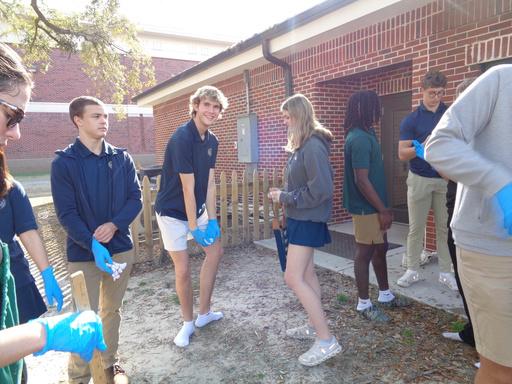
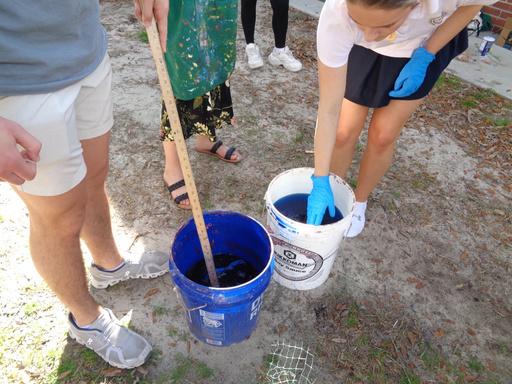

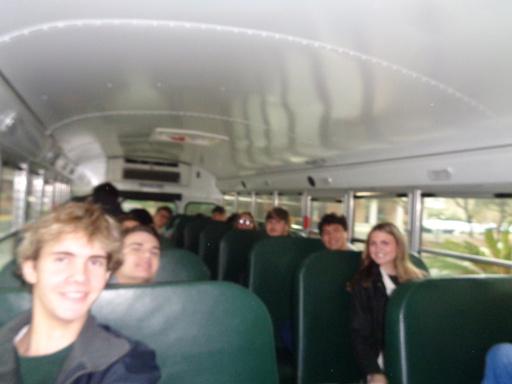

By Will Harmon
The air in Savannah was thick with the scent of salt and old wood, covered in fog and humidity. River Street stretched before Sean and Dan Tinchester, faintly lit by the glow of flickering old-fashioned street lamps. It wasn’t their first time in the city, but something felt different this time. Maybe it was the change in the wind, or the way the old streets seemed to talk softly to them. Or maybe it was the legend they’d read on a blog post, an old woman’s tale of Blackbeard’s ghost ship appearing on the Savannah River every twenty years.
The Tinchester brothers don’t believe in coincidence. They were hunters, born into a family of hunters. Their father, John Tinchester, had dedicated his life to the study and eradication of things that went bump in the night, leaving behind a journal of every being that crossed his path. Monsters, ghosts, and creatures that crawled out of dark corners, Their father had faced them all, and killed all but one. Blackbeard.
John’s journal was clear on one thing, the ghost of Blackbeard came back every two decades, sailing his ghost ship across the Savannah River. Each time, he killed six souls before vanishing back into the mist. The Tinchester brothers had always known they would have to deal with Blackbeard someday. That day had arrived.
The plan was simple. Get in, sink the ship, and get out. It wasn’t going to be easy, but if anyone could do it, it was Sean and Dan.
They stood at the edge of the river now, watching the moonlight dance across the dark water. The street was mostly empty, except for a few tourists and a few locals who had seen too much to care about the things lurking in the shadows. Sean lit a cigarette and took a smoke.
“Think we’ll find him tonight?” Dan asked, his voice a mix of skepticism and excitement.
“Hell if I know,” Sean replied. “But if we do, we’re ready.”
They turned their gaze to the water again, just as the faint outline of a ship appeared in the distance, a silhouette against the black sky. It was a ghost ship. Blackbeard’s ship. The brothers exchanged a glance.
“This is it,” Dan said, his voice a little tighter than usual.
They didn’t hesitate. They knew what had to be done. The boat wasn’t real, not in the way a normal ship was. It was a ghost ship, and if they were to believe their father’s journal, the only way to stop Blackbeard and his crew was to sink it. Once that was done, Blackbeard would be gone for good. At least for another twenty years. They moved quickly, their feet quiet on the cobbled street, until they reached the edge of the river. A narrow dock led out into the water, and there it was, Blackbeard’s ship, its sails billowing in the windless night, its wooden panels creaking like bones in a grave.
The brothers climbed aboard without a sound, the wood beneath their boots groaning as if the ship itself recognized them. They were on a mission. A mission they wouldn’t return from unless they succeeded.
But as they made their way toward the bottom of the ship, they weren’t alone. A figure stepped out of the shadows, one of Blackbeard’s crew, his eyes glowing with an unnatural light, a malicious smile stretching across his face. Before the brothers could react, another shadow moved from behind, knocking them both out cold.
When they woke, the world was blurry and spinning. Their hands were bound with ropes, and their heads ached like they’d been struck by a hammer. Sean groaned, his vision clearing enough to see Dan beside him, also struggling against the restraints.
“Did we fail?” Dan mumbled, his voice weak.
Sean didn’t answer at first. His mind was racing. They had been so close. But something about the ship had changed. The air was thicker here, like it had turned from a ghost ship into something far more real, far more dangerous.
“No,” Sean whispered, his fingers moving to the hidden knife in his boot. He was always prepared, always thinking two steps ahead. It was the only way they survived.
The ropes snapped as Sean sliced through them, and in a few seconds, both brothers were free. They stood up quickly, but quietly, aware that Blackbeard’s crew was still nearby, waiting for the right moment to strike. Sean grabbed two iron rods from the deck. They were heavy and cold, but an effective way to repel spirits, and if there was one thing they’d learned over the years, it was that iron was the key to keeping the dead away.
Dan took one rod, gripping it tightly. The brothers moved down the ship’s deck, their footsteps silent despite the creaking wood. But as they neared the lower levels, one of Blackbeard’s crew members appeared again, stopping them in their path.
With a snarl, the ghostly figure lunged. Sean reacted instantly, slamming the iron rod into the ghost’s chest, the spirit recoiling in a howl of agony. The creature disappeared in a cloud of mist, but the brothers knew this was just the beginning. They were running out of time.
"Dan, we need to sink this damn thing!" Sean yelled over to Dan. “Grab the cannons!”
Dan didn’t hesitate. He dashed toward the ship’s cannons, their massive barrels pointed straight at the water. The ghosts were already regrouping, more of Blackbeard’s crew materializing out of the fog. They needed to move quickly.
Sean and Dan began loading the cannons with iron cannonballs, their hands slick with sweat and salt. With a deafening roar, they fired. The first cannonball sailed through the air, crashing into the hull of the ghost ship. It cracked and splintered, water rushing in like a tide that couldn’t be stopped. Another shot, and the ship started to list.
The battle wasn’t over yet, but the ship was sinking, and with it, Blackbeard’s curse would finally be broken. As the ship went down, the brothers were thrown into the water, the weight of their gear dragging them under. But they swam with every ounce of strength they had left, pushing through the river’s cold embrace until they reached the dock.
Breathing heavily, they climbed out of the water, drenched in saltwater. Sean’s heart was still racing as he turned to Dan.
“We did it,” he said, almost to himself. But there was no time to celebrate. They had to go.
“Damn it,” Sean muttered as he climbed into his prized 67 Chevy Impala, soaking wet, his leather seats ruined by the saltwater.
Dan sat beside him, his face weary. “You know, I’ve never seen a man so upset about wet leather seats.”
Sean grunted, hands tight on the steering wheel. “This car’s everything to me. You don’t get it.”
Dan stared out the window as they drove through the deserted streets of Savannah, heading back to the motel. The early morning light was creeping in, painting the world in muted shades of gray. The city had a strange, almost peaceful feel to it now that Blackbeard’s ship was gone, but the feeling didn’t last long.
As they pulled into the parking lot of the motel, Dan felt his stomach twist. He glanced at Sean, who was already getting out of the car, frustration still written all over his face.
Dan had thought about it a lot, but tonight, the thought hit him like a freight train. He and Sean weren’t like other people. They weren’t going to get married or have kids. It was too dangerous. Their lives were filled with monsters and curses, and there was no room for normalcy.
He sighed deeply, an ache in his chest. For a moment, he wondered if there was anything else to life beyond this endless war they fought. But he pushed the thought away. There was no time for doubts. There never was.
By the time they were both in the motel room, clean and dry, it was late, and sleep came quickly. But Dan didn’t dream of the sea or Blackbeard. Instead, he dreamed of a life that might have been, if only they’d been born into a different kind of family.
The next morning, they packed up, grabbed breakfast at a diner, and started the long drive back to their bunker in Lebanon, Kansas. The road stretched out before them, and neither brother spoke much. Dan stared out the window, watching the world roll by, lost in his thoughts.
No, he thought. He and Sean could never have that kind of life. Not with their past. Not with the monsters they’d faced. Not with the curse of their family’s blood. And so they kept driving, into the unknown, always searching for the next fight. 71
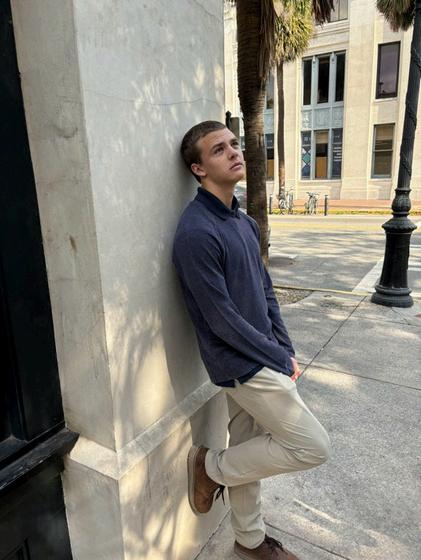

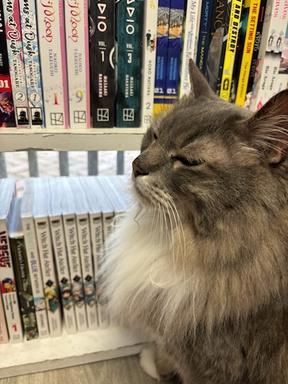


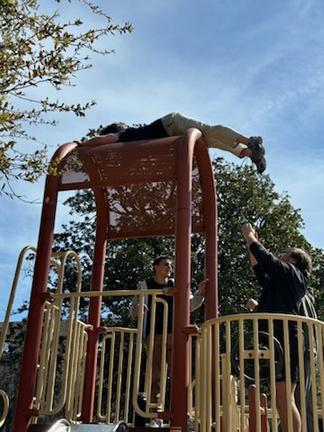
By Juyeon Kim
Late at night, in an alley on River Street, Mark heard a woman ' s scream. Only the sound of Mark’s footsteps echoed a light gravel path. At the end of the alley, the dim light of the streetlight was flickering, and the long shadow under the light was moving in the dark as if someone were watching Mark. The light seemed to reassure Mark temporarily, but he still felt strangely uncomfortable.
Mark had moved to Savannah a month ago. The quiet night in the dark alleys of this city was still strange to him. He came here to escape his past life: an accident caused by excessive drinking, a broken engagement with the person he had promised to spend his life with, and sleepless nights that haunted him even in broad daylight like a nightmare. But the scream he heard tonight bothered him even more. It wasn't a completely new fear, but one that felt strangely familiar, as if he'd seen it before. Like Pandora's box he had tried to bury, but which had opened once again. The scream he had just heard stirred anxiety deep within his mind, like a faint nightmare.
Mark hurried to shake off his uneasy feeling. After exiting the narrow alley, it led to a wide street with a view of the Savannah River. The bustling streets relieved him for a moment. However, the echo of the scream and the lingering shadow wouldn't leave his mind. He turned around several times to look behind him, but the alley remained still and empty.
At that moment, he heard the low voices of two people talking as they passed by.
“Did you hear? They say a woman was killed on River Street.”
“Exactly in that alley?”
“Yeah, but strangely, no one seemed to care. The story just got buried.”
Hearing their voices, goosebumps spread over Mark’s body. The screams and shadows, and the murders in the alley. Is this all a coincidence? Anxiety grew in his mind. He quickly tried to shake off those thoughts, but the ominous feeling grew stronger.
At that moment, lightning suddenly struck and heavy rain fell as if the sky were splitting. The wind howled fiercely, and the moss-covered trees along the street swayed wildly, as if something was hanging from the branches. On a street of mixed rain and wind, Mark instinctively shrank and hurried his steps. He headed to his apartment downtown.
Mark’s apartment was so old that it was once famous for a lot of ghosts, but somehow it looked older and more likely to collapse in the rain today. The walls were old and cracked, and the ceiling turned yellow and left marks of water spreading. The carpet in the hallway was already covered with stains that had faded and could not even tell what had been stepped on, and there was an eerie creak and a smell of rotten wood every time he walked. The old lights on the hallway wall flashed and cast long ominous shadows.
Mark managed to open the door by turning the handle with his damp hands. Mark was exhausted and threw himself into bed as soon as he closed the front door. Fatigue came as if it were crushing all over his body, but as the unpleasant rain stuck to his body, Mark reluctantly got out of bed and headed to the bathroom.
Standing in front of the mirror, he slowly began to brush his teeth. Suddenly, he felt a chill run down his spine. And at that moment, he heard a dripping sound from the bathroom.
“Tap... tap... tap…”
Mark felt his heart drop. He was sure the sink tap had been turned off.
At the ominous feeling, he looked up at the mirror, and in that instant, he almost stopped breathing.
In the mirror, a strange woman was glaring at Mark over his shoulder. Her pale face, with lifeless eyes, looked strangely sad, and her wet, long hair hung limp, covering her face.
When Mark looked back in horror, there was no one in the bathroom and no sign. When he looked in the mirror again, the woman had vanished. However, he felt a cold presence behind him, as if someone were standing right next to him. His heart was beating wildly. The instinct to run away overcame Mark, but his body did not move as if it had hardened. For a moment, Mark heard a whisper in his ear.
“Help me…”
Mark held his breath.
The voice was faint but clear. It wasn’t the sound of the wind or a hallucination. In the midst of fear and confusion, he barely managed to speak.
“Who is it?”
But instead of an answer, the mirror slowly fogged up. Mark looked at the mirror with his breath held. Soon, letters were carved into the mirror as if scratched by a finger.
“The alley... you have to go back.” His heart pounded as fear paralyzed his body. Should he run away now, or... should he follow this voice?
Then, a whisper came back to his ear.
“He’s... still there.”
Her voice lingered in Mark’s head. Mark didn't want to think about anything, so he quickly left the bathroom and sighed and took a deep breath. Then, led by her unfocused eyes, her feet began to move on their own unconsciously. As if being dragged by some force, his body was moving in that direction one step at a time.
Arriving in the alley, Mark saw a figure moving faintly in the dark. At that moment, his head became blurry and soon he lost consciousness and collapsed. When Mark opened his eyes, he was lying in the hospital room. He had a headache and his mind was blurry. His body was heavy, and he felt an uncomfortable energy somewhere. After a while, the police approached. “Mark, are you okay? Do you remember why you were in the alley alone at dawn?”. Mark blinked. Nothing came of the alley in his memory. “I was just at home,” he replied in a confused voice. Confused, Mark closed his eyes, feeling a pain in his head. And soon fell into a deep sleep. Mark stood in the alley again. She smiled at Mark. The smile was cold and creepy. “You’re alive?” she said. His body was frozen and motionless. She looked at him for a moment and disappeared. Mark still couldn’t wake up with the words suspended in his head.
By Tallulah Fitzgerald
The air smelled salty. The wind was sticky, like you just stepped out of a steam room. The loud waves crashed against the shore, crawling up the sand then falling back to the ocean. I felt safe because Charles was next to me, but I wasn’t supposed to be here. My husband was at home, probably pouring himself his fourth glass, waiting for me to walk through the door. But I'm not coming home. I am standing in front of Charles, the boy I used to love, the man I was starting to fall for again.
“I really should leave, this doesn't feel right,” I whispered. Charles didn’t move. He just looked at me with his bright blue eyes, the ones I used to stare at everyday before life ripped us apart. I placed my hand on his face. It felt soft. I slowly moved my fingers to his dark brown hair that was nappy from the ocean. He felt tense, and his face looked confused, like he was trying to control his emotions.
“You can't leave, you know you want to stay,” he finally said. His voice was strong. You could tell he was holding regret. I swallowed, my throat felt dry.
“Charles ” He stepped closer. His body was warm, I wrapped my hands around his neck.
“I know you ' re not happy with him. Am I right?” My silence was his answer.
We shouldn’t have kissed. I shouldn't have let it escalate. But when Charles touched me that night on the north end of Tybee beach, it was like the world stopped spinning. Like the past didn’t exist. Like I wasn’t someone’s wife.
We walked a mile back to his apartment. My flip flops were filled with sand, so he gave me his shoes. It felt like we were young again as we innocently laughed with no worry in the world.
His apartment smelled like a mix of lavender and sweaty socks. His sheets were old and stained and the light in the kitchen flickered. There were piles and piles of dirty dishes in the sink, but it didn't seem to matter because Charles was lying next to me. While struggling to keep my eyes open, I thought about my husband and how I betrayed him.
“This is wrong,” I whispered. He kissed my head.
“Then why does it feel right?” he asked.
I didn't have an answer. The next morning, everything felt different. The sky was cloudy and the waves had calmed down. My stomach felt twisted as I put my jacket on. I was so anxious I felt like I could throw up. I looked for my flip flops that I took off last night, but I couldn't find them, so I slipped on his shoes.
“What happens now?” he asked. I turned to face him and said, “I'm going home.”
He didn’t stop me from leaving as I walked out the door. I think he knew deep down that I would come back, but I never got the chance. That was the last time I saw Charles. One day later, Charles was dead.
The police found him on his bed in his apartment. There were no signs that someone tried to hurt him or break into his apartment. His body was lying there like he had peacefully fallen asleep.
A friend of mine and Charles growing up was the one who told me he had passed. The news hit me like a brick. I was in complete shock, the phone slipped through my fingers onto the carpet. I fell on my knees and crumbled into a ball on my living room floor. The whole world felt still, except I was shaking. My husband, David, who was in the next room over, walked over to me.
“What's wrong?” he asked, as I wiped my tears. I forced myself to breathe. “I lost someone very important to me.”
He had a shocked look on his face, but I pushed that aside. He helped me up and handed me a glass of water. David was never the comforting type. He would make sure I was okay then act like nothing happened. That was one of the things I hated about our relationship. I wanted to feel more loved.
Charles' funeral was small. There was a cold early fall breeze and it was pouring down rain. I stood in the back, gripping my umbrella so tightly that my knuckles turned white. A tall woman stepped beside me. She had strawberry blonde hair and blood red lipstick. She smelled like a clean vanilla scent.
“You were with him, weren't you?” She murmured.
“I don't know what you ' re talking about” I replied with a low but stern voice.
She looked down at her purse to grab something out of it. I turned to see what it was. My flip flops. For a split second I wondered how she had gotten them, then it hit me. Charles must have been married and she was his wife. She turned to face me, her eyes piercing.
“Charles' death wasn't an accident, someone made sure he wouldn't wake up” she said while staring into my soul.
The ground beneath me shifted. My palms were sweating and my face felt hot.
“I know you were with him the day before he died, and I'm going to make sure the investigators know that it was you who killed him.” She stated.
I looked at her confused and shocked. She slowly stepped back and walked away. I thought I might have been dreaming. I was not going to be framed for a murder I didn't commit.
For the next couple days her words haunted me. I had to find proof that I wasn’t guilty. I looked for hours, and had no luck. As I was scrolling through old texts with Charles trying to cope with my grief, I noticed an unread message he had sent just a few hours before he died. “We need to talk. I found out something I shouldn't have.
Meet me tomorrow so I can tell you” A chill ran through me. What had he found out? And who had made sure he wouldn't tell me? That was how I could prove my innocence. That night I carefully constructed my plan. David walked in the room and sensed something was wrong.
“What are you up to?” he said, sitting down on the couch beside me. "Do you want to tell me what’s going on?" I wanted to tell him everything, but I couldn’t. Instead, I shook my head.
"I'm just tired. It’s been a long day." I replied. I barely slept that night, my mind was racing. By the next morning I knew what I had to do. I had to find Charles' wife and clear my name. I searched the internet to find out where she lived and sure enough, It was Charles' apartment. My heart dropped at the thought of going back there but I had no choice. When I knocked on the door, she answered almost immediately.
"I was expecting you, " she said. "I didn’t kill him!" I said in a harsh tone, "But I think I have a clue to find out who did.”
She looked flustered for a moment. Then, she laughed and opened the door and said, “Come in, I want to hear what you think you know.”
I hesitated before I stepped inside, the smell of lavender filled my nose. There were still dirty dishes in the sink, and clothes covering the floor. The apartment looked the same, but felt a little different. She walked over to the kitchen to grab a folder from the counter. She tossed it on the table in front of me and said, "You want the truth? Here. Read.”
My hands were shaking as I flipped through the papers. They were medical records.
"Charles was sick," she said in a softer tone. "He had a heart condition. He didn’t tell anyone, not even me. He was dying, and he didn’t want anyone to know."
I couldn't believe what I was reading. Part of me was upset that he never told anyone, and the other part of me felt relieved to know that he didn't suffer. It felt like I lost him all over again. I cried most of my way home but then I felt calm.
When I got home, David was waiting for me. He didn’t ask where I had been. He just looked at me with soft eyes. I hadn't seen those in years "Come here," he said, holding out his arms. And for the first time in a long time, I let him.
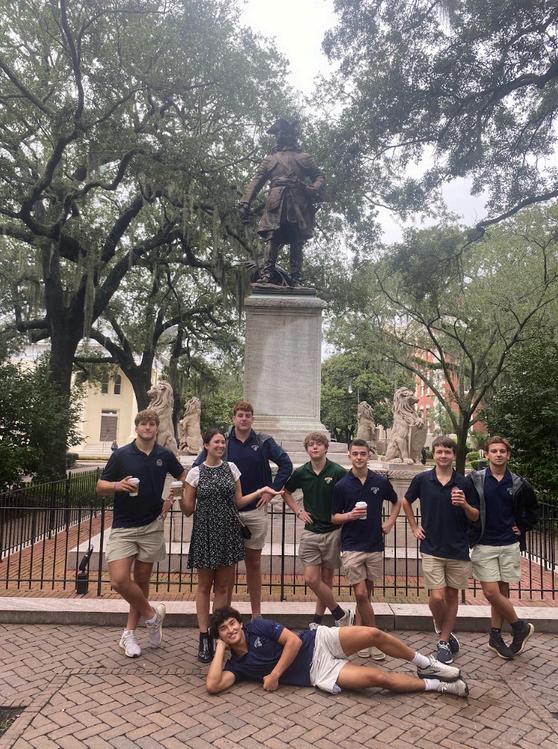
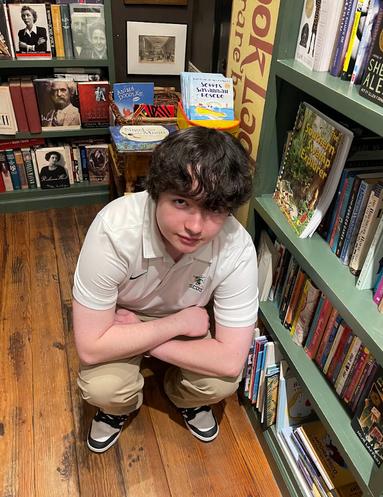
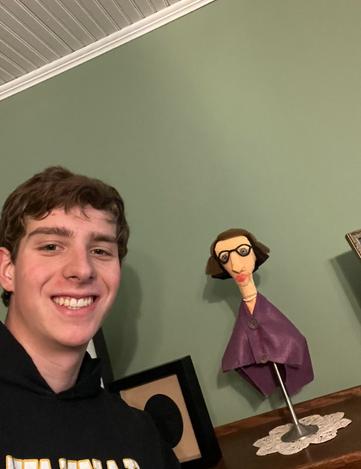
By Nicholas Dunne
“This is a sight to remember isn’t it Johnny”, I muttered as the ocean waves drowned out my voice.
“Nothing like I’ve seen before man”, replied Johnny with awe in his eyes.
The late nights were a commodity to me, a value that came with it my emotions and true feelings.
“I wish the stars could talk back”, I said leaning back against the cold sand.
“Maybe they can, we just haven’t been lucky enough to hear one”, Johnny said with a grin.
These words coming from Johnny, someone I had only met that day on the beach, gave off a feeling of hope, one I had not experienced prior to this moment.
I turned my gaze upward, watching as the endless sea of stars blinked down upon us, as if they were aware of our presence. The soft hum of the waves filled the spaces between our words, lulling my mind into a gentle lullaby. The ocean breeze carried with it a salty tang, crisp and cool against my skin, as if whispering secrets from the deep.
"You think they’d have much to say?" I asked after a pause. "The stars, I mean. "
Johnny chuckled, his breath fogging slightly in the night air.
"Oh, I bet they would. If you sit long enough, let yourself sink into the quiet, maybe you’ll hear them." Something in his voice made me believe him, or at least want to believe him. There was a conviction in his words, an understanding of the emptiness above us that I hadn't felt before.
We sat in silence for a while, the cold sand molding around our bodies, the sky stretching infinitely above. My mind drifted, and for a moment, I almost thought I could hear something–a whisper, like the distant echo of a voice I couldn’t quite place.
"Johnny, where are you from?" I asked suddenly, turning to face him. He smiled, a slow, knowing smile that didn’t quite reach his eyes.
"From here, I suppose, " he said, motioning to the stars. "Everywhere and nowhere, you could say. "
His answer left a strange feeling in my chest, but I didn’t press my luck. Instead, I let myself relax into the motions of the night, letting the vastness of it all wash over me.
Hours passed, or maybe only minutes–it was hard to tell. Time seemed irrelevant here, where the stars pulsed with silent wisdom and the waves spoke tales only the patient could understand.
"You ever feel like you don’t belong anywhere?" I asked quietly, more to myself than to him.
Johnny exhaled, his breath mingling with the ocean air.
"Maybe belonging isn’t about place," he said. "Maybe it’s about finding the right moment, the right company. Maybe that’s enough."
I turned toward him then, really looking at him for the first time since the conversation began. The moonlight carved out his features like soft silver, but something was off. His form seemed… lighter, almost translucent, as if the light didn’t quite settle on him the way it did everything else. A strange unease crept up my spine.
"Johnny, have we met before?" I asked hesitantly, my own voice feeling distant. His expression remained calm, but his eyes flickered with something unreadable.
"In a way, " he said. "You’ve been looking for someone to talk to, haven’t you? Someone to listen?"
The air around us felt heavier, or maybe I was just noticing it now. My thoughts raced, pieces clicking together in a way I wasn’t sure I was ready to accept.
"Johnny…" My voice trailed off as a realization settled over me like a tide receding, revealing the truth hidden beneath.
"You’re not real, are you?"
Johnny tilted his head, a soft, almost sad smile playing on his lips. "Does it matter?"
The wind picked up then, stirring the sand around us, and I blinked against the sudden rush. When I looked back, Johnny was gone. Only the waves remained, whispering to the shore, and the stars above, shining down with quiet understanding. I leaned back against the sand once more, closing my eyes and listening, really listening. And for the first time in my life, I thought I could hear them.
The dim light glooming through the heavy air blinded me, the whiteness fading away with my memory, and just like they come, they go. The moon’s rays bounced off of the rainglazed dunes, the light playing and dancing in circles before my eyes. The night had passed, and with it, Johnny. He was never meant to stay, just like the fleeting glimmers in the sky. But even as the dawn approached, I held onto the feeling, the whispered words of the stars echoing in my mind.
By Tyler Scott
Why is Lebron the greatest basketball player ever? Or Drake, one of the greatest artists ever? They are truly masters at their craft, and they've shown that they can be great at what they do for many years now. Fortunately for me, I was born at the time to get to witness the greatest basketball player ever, and one of the greatest rappers ever. For the short amount of time that I have been alive, I have realized that there are many people in the world who are great at what they do. As we grow and age, we learn to develop favorites and they are seen as better than others.
For example, Lebron is my favorite because he's an amazing person and an even better basketball player. It's hard not to like someone who's done the things that he's done. Being a great player is one thing, but his ability to affect others around him off the court is truly remarkable as well. On the music side of things, it's gotten to the point in my mind where I think that every album that Drake releases will be great. I think every album he has released so far has been amazing, with each one containing marvelous songs. While being a legend is great, it comes with a rival, who wants to take your fame and glory whenever they can.
It was All-Star Weekend in 2025 and Lebron happened to be strolling down River Street with Lavar with him.
Enjoying the break that they had for a few days, they stopped by Spanky’s for some eats, and shopped at the many other stores downtown, trying to somewhat keep a low profile to avoid the many fans that they had in Savannah. It seemed like a normal week off until Lebron’s phone rang.
“Drake? Why could he be calling me? Haven't heard from him in a while.”
“Maybe he wants to get you on one of his songs Bron,” Lavar responded.
“Yo Drizzy, What's good?”
“Bron! I missed you a few weeks ago when you guys played in Toronto. Been meaning to get out the studio and come see how you and Bronny have been doing. We need to catch up somewhere when you get a chance, and discuss how we can continue to dominate everything we do. But, the real reason I called was to ask you for a huge favor. Kendrick and his people keep coming at me while I'm not even tryna beef with him anymore. I talked to him and he said he wants to see us settle this on the court. So, I thought there was nobody better for the challenge than you! The greatest player anyone has ever seen!”
“Drake, you know I'm on break right now though.”
“Man Bron it aint gonna be anything too crazy. Just a quick 2v2 to settle the beef once and for all. But the thing is, I haven't hooped in years it feels like, so me and him both agreed that we would be the coaches for the game. Which means you just need to find a teammate.”
“I got my guy Lavar with me, but you owe me after this Drizzy, especially if I win this for you. I'm on your side with this whole rap war you guys got going on, but that aint enough to stop the fact that everyone thinks you are a worse rapper than him. People have lost their minds. I'll do what I gotta do to win this 2v2.”
“I knew I could count on you Bron. I got 1000% confidence in your ability to win this. I don't think anyone on this earth could beat you. I'm hoping he tries to get MJ on his team. If that happens, then we'll find out who the real GOAT is. We also need to decide on a place to play. Because he thinks we ' re gonna get killed, he said we can have the home court advantage. I was thinking we could play in Toronto, but that's kinda out of everyone ' s way tbh. If you had an idea of where you'd like to play, then I'll be down.”
“Why not in Savannah? I'm pretty sure I heard of an arena or court being somewhere around from the locals.”
“Bet, if they got a place there I'll get on the plane asap.”
By Ian Rogers
She considered herself a summer child, but she looked in the mirror more than she looked at the foliage. Daphne Fowler was born on June 20th, 2006, which, according to the Summer Solstice, was the day before the true start of Summer. Her dad always told her she was a Summer Child despite this fact. She had orby, blue eyes often mistaken for teary in her early childhood, so everyone would always ask why she was crying; everyone except her dad. He would take her downtown every weekend to go on a new escapade of doing a whole lot of nothing. They’d wander around bookstores. Daphne would read the backs of covers that were far too advanced for her age because she saw her dad do the same. They’d walk square to square, from Telfair to Washington, observing and stopping anywhere that caught their eyes. For Daphne, it was always the trees that were so much bigger than her.
“Dad, what is it like being as tall as the trees?”
“Honey, do I look as tall as the trees?”
“Almost.” Daphne stretched with a smirk on her face. She had her dad’s smile, and he knew it. Together, they sat under her favorite tree in Madison Square after leaving E. Shavers. Daphne, with a rotation of the popular books of her age group, Harry Potter and Percy Jackson, and her Dad with bigger books with bigger words that Daphne would sometimes peek at. The grass was greener downtown. No matter the season, no matter where it was downtown. When it wasn’t Madison Square, it was Forsyth, where they would play Uno on sunny days, or it was Ellis Square in the evenings of hot summers. Daphne always said she didn’t want to get wet, but by the end of the night, she would end up in the fountain sprinklers, drenched.
Whenever they walked by mirrors or freshened up in bathrooms, Daphne’s mind would wander.
“Dad, why do I cry?” she often asked, met with the same answer.
“Since you came out of your mom, you haven’t. That’s when I knew you were a tough lady, and you haven’t changed since.”
Eventually, her immediate family and school got used to her teary eyes, but Daphne didn’t. Now, a teen, she stands in her vanity.
“Stop
As more ribbons unraveled, she realized she couldn’t stop them. She figured that if she got all her tears out now, she could get them out of her way for the rest of her life. Now that Dad was gone, she wanted her teary eyes to be shriveled up and dry.
“Dad told you that you never cried, so stop.”, she whispers because she knows her mom hates to hear her talk about Dad.
Since her Dad's departure, they recognized the tension in the house respectively but would rather gouge their eyes out than address it. Dad was the confrontational one, so now they both feel stuck in a hole, shovels in hand, digging beneath one another each day they fail to mention the inevitable. Even though she hadn’t said so, Daphne believed her mom to be moving on. Her work ends at 5 pm, but she consistently got home around 8 pm. This was mom’s routine. Daphne’s routine was written in her Notes app in case she ever forgets: She wakes up at 6:50 am, with the sun. Outside her window is a tree on the verge of death. It could never equate to the one in Madison Square, she thinks every morning. She then goes to her vanity and spends 10 minutes staring at herself.
She picks zits till they bleed and picks at scabs from picking the previous morning. If she’s feeling particularly lifeless, she will apply some makeup to put a smile on her face. Zoey picks her up since Daphne hasn’t driven since Dad. Zoey had been her best friend since childhood. Daphne doesn’t think they work well together anymore, but to separate would be much more effort than to suffer silently.
Zoey would often tell Daphne about all the rendezvous she goes on every weekend. The certain “rendezvous” that most teenagers should be going on, but not Daphne.
“Can I come over this weekend? I miss our sleepovers.”, Zoey remarked.
Daphne was frankly taken aback. Zoey was her best friend, but also, in her eyes, cool. To think that Zoey’s weekend rendezvous would be Daphne’s house and not some bar she got into underage on Broughton, or a movie with her fairweather friends and cute guys that she couldn’t pick between was hard to wrap her head around. She was always moving from one place to another, never stationary. Why would Zoey want to come over to her house where time always seemed to move slower? Despite this question that plagued her mind, she thought it might be nice to not harp on Dad for a weekend.
“Sure!”
On Friday, before the sleepover, she got a memory in her Photos of one of her and her dad’s many escapades. She often wondered if her Dad and Mom ever had time to be in love with how much Daphne took her father’s time. She would never tell her mom but always thought Dad loved her more. But he wasn’t here to defend himself, so she kept her mouth shut.
This particular memory was on Tybee, skipping school to spend sunrise to sunset on the beach; a picture of a strip they took in a photo booth. It allows Daphne to feel warm about Dad when her usual feelings are cold and despondent. The drive to Tybee was 45 minutes. She remembers the day so vividly, windows down with Dad’s music playing, all the music she can’t stand to listen to anymore. Although she's tried, the question of “What’s going on?” from “What’s Up?” by 4 Non Blondes never provides her comfort that someone else is wondering the same. The last time she heard “Hotel California” by The Eagles, Dad’s routine beach song, all she could hear was his voice and never Don Henley’s. She smelled the low marsh and always got sand all over the car, no matter how hard she banged her shoes on the hot concrete. She had no idea where the photo went, and her curiosity got the best of her.
She went into her parents' bedroom and braced their bed. One side was perfectly made and gaining dust; the other was messy and undone. She got tunnel vision as she looked at her dad’s nightstand and braced herself to search for it, trying to find pieces left of him.
Opening it, it was kept clean, just like Dad. On the left was the photo strip, along with a few other pictures of the two of them. On the right were various Savannah postcards that he liked to collect of almost every square, River Street, and Tybee. Daphne always had a sense that her dad never wanted to stay in this town forever, no matter how much he loved it. She just wishes that he took her with him. It was funny seeing inside his nightstand, which was only a mere few feet from her mom’s. They had loved each other for so long, but if you only knew her Dad based on this nightstand, you would think that mom didn’t exist. That he was a single father and doing it right.
She looked through the photos her dad had labeled most precious to him, and they became blurry in her vision. There they were again. The tears. She rubbed her eyes till her face was red, till it gave the look of sobbing, though that was not her intention. It was only a tear or two, but it felt blasphemous being this close to her dad’s belongings and soul. She looked at her hands holding the pictures and considered them cursed. She dropped them on the carpet as she heard Zoey pull into the driveway.
At the door, Daphne looked like a mess and played the role.
“Hey! Oh… hi.”, reading Daphne’s look, more distressed than usual.
“Want to get food at the Mexican restaurant down the street? I would say let’s go downtown, but your house is kinda far away, and I don’t have enough money for gas. Is that tree dying?” pointing to the one outside Daphne’s window.
“I wish it would bite the bullet and fall on my room.”, she said in a comical tone, with a layer of seriousness that Zoey could read after all their years of unconsciously studying each other.
Neither of them liked the Mexican restaurant, but they went for the nostalgia, from when Daphne’s dad would drive them and entertain them like a jester as they ate greasy, mediocre tacos. Yet, now, Daphne hates it because it has nothing to do with Savannah. Zoey hated it because they didn’t have a salad she could take two bites of as an excuse for a meal.
“Why would they build a chain Mexican restaurant here of all places? This city has so much history and culture, and this building is motionless.”, Daphne remarked, walking in. She hated it because her dad loved it.
“Why would they not have any healthy options?”, Zoey questioned, only half listening to Daphne.
They sat in their usual booth. Daphne’s inflammation was down to a light pink, which was a nice vacation from her usual lifeless pale tone. Daphne sat on her hands because the building was freezing. She regretted wearing a skirt she got from Glory Days Vintage on Broughton because now her legs were freezing, but she wanted to look nice for what felt like her first time going out.
Zoey stared at the shiny wood table, and Daphne stared at Zoey.
“I’m worried about you, Daph.”
Daphne’s face immediately reddened again.
“Why?” trying to play it off.
“Well, your mind is constantly somewhere else. I get that everything with your dad was hard, but your mom has moved on, and everyone else seems to have too. We haven’t laughed together since, and being around you just feels like a ticking time bomb. We used to drive with the windows down, and now you insist they are up. I love your eyes, but I can’t look into them anymore because it feels like there’s always a tear that's about to roll down your face. An actual one, not just the ones everyone sees.”
There was pure silence. Zoey’s eyes were still on the table, and Daphne’s eyes moved to her skirt, still regretting wearing it.
“I can’t control my eyes, you know that. Can you take me home?”
Zoey didn’t acknowledge her request but stood up. They drove home, and Zoey had her window down. Daphne watched the wind in her hair, looking perfect as ever. It was effortless. She could read off of Zoey’s face that she thought of herself as imperfect.
Zoey would look in the rearview mirror and move an eyelash or rub her blush, but it didn’t make a difference in Daphne’s eyes.
Sometimes, when Daphne spent all her time in the mirror, she’d imagine herself as Zoey so she could finally walk away from the vanity. When they used to hang out at Daphne’s house, they’d sit in the vanity together, doing each other’s makeup. They wanted more than anything to look like each other, and neither knew. Whenever they’d drive in Zoey’s Bronco, it would look like a man’s dream commercial, with wind blowing in their hair and constant laughing. Now, Daphne wasn’t ready to face the wind, and Zoey hadn’t stopped chasing it.
Daphne was dropped off around 8:30. It was clear to both that they wouldn’t be speaking to each other for a while after tonight. Daphne strolled through the door, heavy-stepping, meeting her mom in the foyer. She saw her holding the pictures from her dad’s nightstand she had examined earlier in her hands. Daphne hadn’t thought it at the moment, but she knew her mom was sensitive to the subject of her dad. Her mom looked at her with horror and disgust, like she had some ulterior motive besides finding pieces left of him.
“You did it on purpose, forcing me to never let him go,” she spoke, with her lower lip quivering.
“I’m sorry.” were the only words Daphne could mutter before breaking into tears. It was the first time Daphne and her mom had even mentioned her dad to each other, and with her wound in the shape of Zoey so fresh, she couldn’t handle it. Daphne wasn’t sorry for remembering her dad because she hadn’t stopped for a mere second since he left; she was only sorry that she forced her mom to do the same.
Daphne knew these were tears she couldn’t run away from. She wanted no one to see them, not even her mom. The tension was choking her, and she couldn’t stay in the house. With no Zoey to call, she grabbed the keys to her mom’s car and bolted despite not driving for months.
It was dark out and raining, with nowhere to go, so she drove to the only place that felt like home. In what felt like the blink of a teary eye, she was circling Madison Square in the pitch black. The occasional couple was strolling through the square after dinner. Daphne stopped the car in the “30minute parking” and found herself under the same tree her dad used to find her under.
Sitting at its roots, the tree felt smaller than when it used to feel so big. Daphne is now the same height as her dad, yet she feels smaller than any of the first memories she can recall. Ribbons rolled down her face as she assumed all the reasons her dad would be disappointed in her if she was still around. She’s hurt Mom, she’s lost Zoey, and she can’t control her crying.
She sits frigid in her vintage skirt, unaware of her cold dead hands. She looks up at the leaves, and a gust of wind blows her hair to a harsh side part and, with it, blows away her tears. Leaves fall all around, harmonizing like a choir, falling on her face to wipe the streaks of sobbing. Her howling secedes to pure lament as she feels like the presence of her dad is the one to wipe away her tears. No entity, just the nature that he loved so dearly doing the work for him. Daphne stood taller in an empty Madison Square, the same height as her late father. She smiled to tell him that even though it looked just like his smile, she loved it anyway. Walking to the car, she shed one more validated tear.
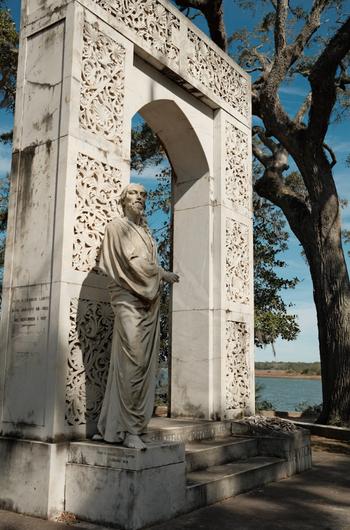

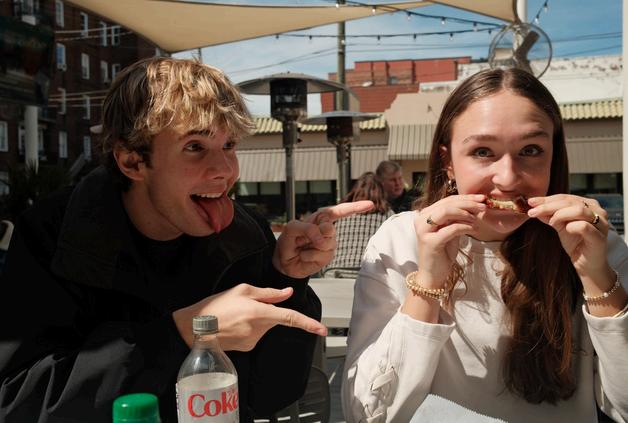
By Kent Burnett
Oaks lean in with grace,
Their tree limbs like fingers
Blocked by veils of moss
Ghost soliciting by the base
Each cobblestone of Savannah a secret
Each square a play
Good and evil people dance together
It is a perfume and poison
Manicured hedges
Soil carries the dead to their destination
With a sigh not even the wind could carry
Gas lamps flicker
Light tickles the edge of shadows
And where silence is never completely empty
Something awaits in Savannah
Not good nor evil
By Meg Howington
The woman in stilettos strides down the street, On her way to Club One, she couldn’t be beat.
She struts down Broughton, a queen without a throne, No mask, no lie; her voice and skin her own.
People whispered, children stared; But the woman in stilettos didn’t care. She takes their hate as love and scorn as praise, Nothing could bring her down, even on bad days.
The woman in stilettos has no fear, She stuns her enemies, like headlights freeze a deer. Each tap of her heel, a truth is revealed, Her authenticity and humor as her shield.
The woman in stilettos defies all odds, But mainly; she defies all frauds.
By Andrew Wynn
Illian had always felt like a ghost in his own life, unseen, unheard, and with a perception of life that no one else could understand. He and his father lived a modest life in a small coastal city in Georgia. His house was never the biggest, his clothes could always be newer, and it seemed as if Santa skipped over his home every year. They both lived bland lives and while his father was just fine with how they lived, Illian longed for something much more.
It was in the summer of ‘87, and Illian’s father slaved away at work daily. Seeing this Illian had decided he would get a job of his own. He had spent weeks prior calling local businesses that were looking for employees, which he had seen in the weekly newspaper. After not hearing back for almost a whole week, he started to lose hope until, eventually, he got a callback. It was a new publishing company in the middle of downtown. At the time, he didn’t even know what publishing was, but he knew he needed the money, and turning this opportunity down would be a huge mistake. After talking back and forth for a few days, they invited him to do an interview, which brings us to the present.
It was a Thursday which meant Illian's father would have to pick up an extra shift and wouldn't be home until late that night. With his father having to leave extra early that day and with no one else to wake him up, Illian was rudely awakened from his sleep by the piercing sound of his alarm clock. His head shot up, and he reached over to turn off the alarm. When going to hit the kill switch, he realized the time. It was 10:34, which means he had overslept by over 30 minutes. When realizing this, he shouted “F*ck” and sighed with much dissatisfaction.
He popped up out of bed, ran to his closet, and pulled back the wooden fold-in door. He knew he needed to wear something nice, but he wasn't exactly sure what nice was. He hopped up and down, putting his legs into his khaki cargo pants one leg at a time. Losing his balance each time he landed, he eventually got them up, and now it was time for the shirt. He quickly reached his hand into the dark, dusty abyss that was his closet. With one swift movement, he pulled out a black shirt that read “Metallica” across the front. Illian shrugged and slipped it on over his head. With his clothes on nicely, he rushed down the stairs and into the kitchen, where he was met with a note reading, “Your breakfast and milk are on the table. Put the dishes in the wash when you finish up -Dad.” Illian ran to the table and shoveled the plate of eggs and bacon into his mouth as if it were his last meal. Once he cleaned off the plate, he went to drink the glass of milk. Before he could lift it up he got a terrible feeling in his gut. He put the cup down and poured himself a glass of water, leaving the milk out on the counter. Illian ran to the front door where he was met with his two options of shoes. Sandals or his new Reeboks. After a moment of weighing his options, he decided to go with the obvious choice between the two: sandals. He rushed out the door and grabbed onto the old red bike that he called “Lucy.” It was a gift from his mom before she had left, so he decided to name it after her. He walked it over to the fence at the front of the yard and swung open the door. He hopped onto the bike and instantly started pedaling down the street as fast as he could. He knew that the building was only a few blocks away so he still could make it in time. He looked down to check his watch, “10:45”. His interview was scheduled for eleven.
Although it wasnt looking great, Illian knew that he could make it. He thought about his father and how hard he worked to put food on the table and a roof over their heads. Sweat started to fall from his forehead, and something clicked. He pushed his legs into the next gear and pedaled faster than he had ever before. He made a sharp turn and crashed! He went flying over the handlebars just to land with a loud thud at someone ' s front door. It was a run-down house with its windows boarded up. Although it looked to be abandoned, something drew his attention to it, and it was hard to look away. After staring intensely at the house, the vex wore off. He jumped up, remembering the time, and wiped the grass off of his shirt. He got back on the bike and went right back into peddling like his life depended on it. After a grueling few minutes on the bike, he saw a sign that read “Phantom Mind Publishing.”
He hopped the bike onto the sidewalk and ran inside with only minutes to spare. He ran to the bathroom to try and dry himself off but when he opened the door, there was someone at the sink. It looked as if he was cleaning a stain off of his jacket, so with a brash decision, he walked right back out. He went over to the receptionist stand and said, “Hey, I’m here for an interview.” The receptionist glanced at the computer, then looked back up, saying, “And what's your name?”
“Illian; Illian Krank.” the receptionist looked back down with a disdained look.
“Down the hall and take a left,” she said. Illian quickly followed the command and was met with a door at the end of the hall. He went to knock, but before he could hit it the door swung open, and he was drug inside by the lead publisher, Aaron Smith. After a long back-and-forth conversation
spanning over an hour and a half, Illian had gotten the job; his personality, coupled with his drive to work, seemed to be just what they had been looking for.
Illian was happier than ever that he got the job. There was nothing he wanted more than to get home and share the news. He hopped on his bike and started on his way back home. While zooming down the street, he saw what looked to be a diner. From what he could see through the windows, it didnt seem to be too packed, so he decided he would give it a try. He parked his bike outside and happily skipped his way in the door. He looked around and saw a sign saying, “Please seat yourself,” so he went to the farthest corner and took a seat in the booth. He listened to the calm 50s music as he tapped his feet to the melody. That's when what seemed to be the girl of his dreams stumbled through the door. She had a special look to her, something so beautiful, Illian couldn't quite put his finger on it. She sat down on the other side of the diner on a high stool. He stared at her, hoping that she would eventually look over. He kept doing this until she finally turned to look at him. They made direct eye contact, and he could feel butterflies in his stomach. His legs felt like noodles, and his palms started to sweat. He quickly looked away, but she didn't. She kept her eyes still on him. He glanced back a few times before noticing this. Finally, she stood up and walked over to his booth. “Hey…” he said before being interrupted. She said, “Are you just gonna keep looking at me.” his heart skipped a beat.
“No, im joking,” she said, “my name is Ana, what's yours.”
“Illian,” he responded. She sat down and they talked the hours away, sitting there till after dusk.
They had been so focused and talked for so long that they failed to realize the waiter had never come to ask for their order. They were both a little confused. They stood up and walked out, thinking that maybe it had been closed and they didn’t know. “Hey, I know it's late right now, but would you maybe wanna hang out tomorrow?” said Illian. Ana responded, saying, “Sure. What do you want to do? We could go to my house.”
“Sure, I'll see you there. Around 5?” said Illian. “Sounds good!” said Ana. They both stopped and began to leave before Ana turned around, saying, “Oh, I forgot to give you my address!” She took out a pen and napkin and wrote it down. “15 Grove Street.” it was the address of the house he had run into earlier They both went their separate ways. Illian got back on his bike and rode it, grinning ear to ear. When Illian got home, and threw his bike up onto the porch and ran inside. His dad wasn't home yet, so he went into the living room to watch TV. He turned it on, but all that played was static. He tried changing the channel and adjusting the antenna, but nothing worked. He turned it off and headed up to his room. He laid down, assuming his dad wasn't coming home until later. As he dazed off, he was abruptly awakened by his door being thrown open. He quickly turned over to see his dad standing over him. “Why didn’t you drink your milk?” he slurred. “Dad, what… what are you talking about?”
“Your milk, go drink it now!” Illian's father said.
“Dad, you ' re drunk, go to sleep.” Illians dad got angrier. He grabbed Illian's shoulders and shook him violently. In one swift move, Illian threw his father away and dashed out of the house without saying a word. Illian thought, “In the past, he has been like this, but only when he drank and…”
Then he remembered. Thirteen years ago to the day, Illian's mother left them both without even saying goodbye. They hadn't seen her since, and it must have stricken a nerve in Illian's father on that particular day. Now Illian knew the problem, but there was no way to fix it, not until his father sobered up at least.
He got back on his bike and pedaled away into the night without looking back. He wasn't sure where he was going until he remembered, “Ana!” he looked down at his wrist and read the address off, repeating it to himself. “15 Grove Street, 15 Grove Street, 15 Grove Street.” He had lived in Savannah since he could remember and knew the city inside and out. He kept pedaling until he finally arrived at the house. He parked his bike out front where he had fallen earlier that day. He ran up the steps and knocked on the door. Instantly, Ana opened the door. “Hey, what's up,” she said.
“Um, I know this is kind of soon, but is there any way I could come in; my dad is freaking me out, and I have nowhere to go.”
“Uh ya, that's fine, come in.”
He walked into the decrepit house and noticed the lights were all off. “What's up with the lights?” he said.
“Oh, we need to change out the bulbs.”
“Oh, alright,” said Illian. While they seemed to be fine at Ana’s house, Illian's father was freaking out. He assumed that Illian would be back within the hour, but it was 3 hours past that, and he still hadn't come back. He dialed 911 and got an operator on the phone.
“Hello, this is 911. What's your emergency?”
“Hey, my son is off of his meds, and now he ran away; I'm not sure where he could have gone!”
“Alright, and is he armed?” said the operator. “No, but he is schizophrenic, and I'm scared being off of the meds has already gotten to him.” The 911 operator hesitated for a moment as she typed the number into their system. A name immediately popped up Gerhardt Krank with a flagged history. Her eyes widened. “Sir,” she said carefully, “can you confirm your full name?”
There was a long pause on the line before his father grumbled the answer. As soon as he did, the operator discreetly signaled the officers on duty, her voice calm but firm. “Stay where you are, Mr. Krank. We’re sending officers to assist you.” Meanwhile, in the background, she pulled up past reports where she saw a history of psychiatric evaluations, medication refills, and an old case from over a decade ago when his wife had tried to get emergency help for him before she disappeared. Everything was clear; Illian had never been the one with schizophrenia. It had been his father all along, medicating himself inconsistently while projecting his illness onto his son.
Meanwhile, Illian sat on the floor of Ana’s dimly lit house, hugging his knees as she leaned beside him, her presence grounding him. “Maybe we should go check on your dad,” she suggested softly.
Illian nodded his head in agreeance. They both headed out of the door and got onto Illian's bike. While Illian sat in the seat, Ana stood on the pegs behind him, latching onto his back. They set off once more back to Illian's home. They got to his street, but before they were able to make it to his house, they saw red and blue lights flashing outside.
They had pulled up just in time to see two officers escorting his father out of their house in handcuffs, his shouts incoherent and desperate.
“No, no; you don’t understand! It’s my son! It’s my son who’s sick!”
He screamed as they guided him toward the patrol car. The sight was surreal, like watching a movie; he couldn’t do anything to help. Illian felt his breath stop, his entire reality crumbling in front of his eyes.
“But… but I have no one now,” he whispered, barely audible under his breath. Ana placed a reassuring hand on his arm.
“You have me,” she said.
And for the first time in his life, he believed it.
By Jeremiah Brown
I did something bad. I didn’t mean to but I did. I found this old book in my grandpa’s attic. It had weird words but I read them anyway, just for fun. But now I wish I didn’t. I was walking home last night down River Street. It was cold, real empty, but then I felt something behind me. Like the air got thick, heavy like breathing smoke. The street lightsstreetlights flickered as I passed under them one by one. The cobblestones under my feet felt uneven, shifting like the ground wasn’t steady. I heard footsteps, but they kept going for a second longer when I stopped. I turned around and saw it. A shadow, not a person, but moving like one. It walked right past me. Didn’t touch me but still, I felt it. My insides twisted like I was being squeezed from the inside out. My teeth ached. My bones burned. Then my head started to hurt. The river smelled wrong. Like rot, like something was watching from the water. The street got colder, and I swear I heard something whisper my name in the wind. I ran after that. Didn’t stop till I got home. But even inside the cold stayed with me. The feeling stayed with me, I was spooked. I got home and the pain got worse. I couldn’t think straight. My body didn’t feel like mine. I went to the bathroom and then I don’t even know why I did it. I smashed my head into the sink. Hard. I remember the crack sound. I remember blood, a lot of it. It smeared the mirror, pooled in my hands. But I don’t remember stopping. It was like something else took over. When I woke up, I was on the floor, my face wet. I think I was crying. I think I was screaming.
But it wasn’t just pain. It was something deeper, something growing inside me. The moment I hit my head, I swear I heard laughter. Not mine. Not human. A slow dragging sound like something pulling itself out of the dark. I looked into the mirror and for a split second my reflection didn’t move like me. It smiled but I wasn’t smiling. …
My head hurts so bad. I can’t think well anymore. I try to write but the words are wrong. I see them but they don’t feel right.
Last night I saw the shadow again. It was in my room. It doesn’t have eyes but I know it sees me. It’s tall and thin and shakes when it moves. It whispers but I don’t know what it says. It’s in my skin. I feel it in my skin. It got hands, long ones. It touched my face but I didn'tdon’t feel anything. My mom came in and I tried to scream but I couldn’t move. She turned on the light and it was gone. But it’s still here. I know it’s still here.
I tried to tell her butmy but she doesn’t see it. She said I had a bad dream. But it’s not a dream. I know it’s not. I know it’s real. It’s in my head. It’s in my blood.
Tonight I saw it closer. I was awake this time. It came out of the mirror, crawling like its bones were broken. It reached out and my whole body locked up. I could feel its fingers press into my skin but my flesh didn’t move. Like I was stone. It leaned in its face, almost touching mine. Its mouth opened and I swear I could hear my voice inside it. Calling my name. Begging. …
Priest help me. I can’t fix my head. I see black spots. My hand shake. It came back last night. Stood over my bed. I couldn’t move. It told me things but I can’t remember. My head feels full. Like something is inside. Something moving. It doesn’t just whisper now. It laughs. It laughs real low real slow. I hear it when I blink. I hear it when I breathe.
I try to block but it’s always there. It is in the mirror. It is in the walls. It is ME.
I know what I have to do.
Blood is the only way to let it out. I see my reflection smile at me. But I’m not smiling. It is. It says it’s ready. It says I am too.
I hear the sink calling. The mirror hums when I look into it. It tells me it will be easy. Just one more hit. Just one more crack. Then I will understand. Then it will take my place and I can sleep.
I think I want to sleep. I think I want to let it in.
But there’s more. It’s not just in the mirror. It is a wind in whispers on River Street. I went back there last night. My feet take me even when I don’t want to go. The river moves strangely. Water twists, twists wrong. And I see faces. Not mine. Not people. They are under the water. Watching. Mouths open, but no sound. Eyes gone.
The shadow stood there too. Waitin. It says my name. It says I’m close. I don’t want to be close. But it pullsed me. I feel my feet sink in the street like cobblestones turn to hands, grabbing my ankles.
I don’t run this time. I stand. I listen. And it tells me I was wrong. It doesn’t want me dead. I want to be open. Want me hollow. Want me to let it in so it can walk in my skin. I look down at the water and I see my reflection again. It reached out. Not like before. This time, it pulled. And I feel myself fall forward, into it. Into the cold. Into the dark. I write this so someone knows. I don’t know if I’ll be here tomorrow. If I wake up and I’m not me anymore, don’t trust what I say. Don’t let me in. Don’t look at the river. Don’t listen to the whisper. It’s already too late for me.
I’m not in my house anymore. I don’t know how I got here. The ground shook, the air screamed. Light comes and goes too fast. My feet on the metal on the track. I hear it. I hear the train.
The shadow here too. It’s beside me. It’s inside me. It says it’s time.
The light gets brighter. The train comes fast. My feet move on their own. I step forward. I hear laughter. I hear my voice. But I’m not laughing. I step again. The light swallowed me. And then

